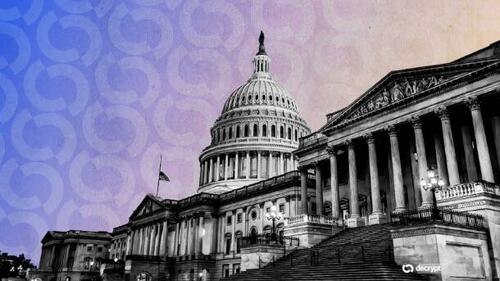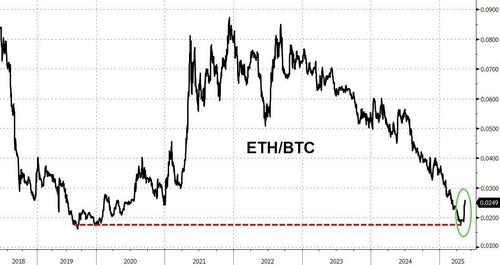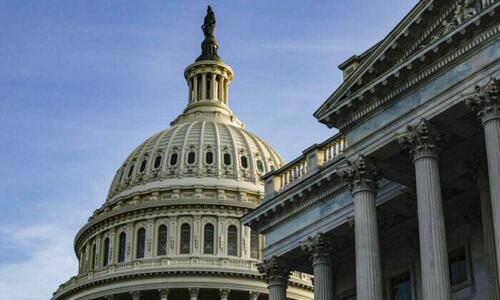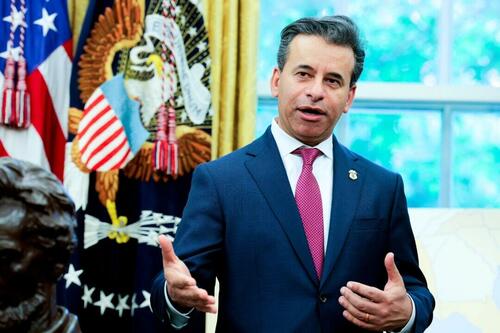“If you believe what you like in the Gospels, and reject what you don’t like, it is not the Gospel you believe, but yourself.”
Distinction Matter - Subscribed Feeds
-
Site: Zero HedgeEd Martin Reveals J6 Pipe Bomber Probe Shakeup, Warns DOJ 'Much, Much Worse Than People Think'Tyler Durden Wed, 05/14/2025 - 16:40
Ed Martin, a senior official in the Trump administration’s Department of Justice, is warning that corruption within federal law enforcement is far more severe than the American public realizes. Martin, who holds the roles of Director of the Weaponization Working Group, Associate Deputy Attorney General, and Pardon Attorney, made the comments during an interview with Tucker Carlson.
Martin weighed in the unresolved case of the January 6, 2021, pipe bomber, expressing frustration with the investigation’s lack of progress, wondering whether the lack of answers may have been intentional. “The pipe bomber—as a prosecutor - I’ve got the pipe bomber case in my office,” Martin told Carlson. Martin revealed FBI Deputy Director Dan Bongino told him that the bureau had reassigned agents to the case, however, the renewed effort was still in it early stages. “It’s been going on for five weeks?” Martin said, likening the past probe to the bumbling “Keystone Cops.”
Starts at 16 minutes
Ed Martin was on his way to cleaning up Washington as the new U.S. Attorney, until Senate Republicans decided he was too sincere and killed his nomination.
— Tucker Carlson (@TuckerCarlson) May 14, 2025
(0:00) Introduction
(1:20) Ed Martin’s Response to the Crazed Leftist Who Spit in His Face
(7:21) Why Would Republican… pic.twitter.com/WBtNxdnAqgMartin further criticized the FBI’s previously handling of the case, alleging that basic investigative steps were overlooked. “They didn’t interview some of the people that you would have said, ‘That might be a suspect.’ They hadn’t interviewed him,” he said. Raising concerns about the agency’s competence, he added, “The question becomes, ‘what’s happening here?’ Is it incompetence? It feels worse than incompetence.”
When asked by Carlson whether the DOJ is worse than people believe, Martin went further, declaring, “I think it’s worse than incompetence.” However, he urged that importance of following the facts and not getting ahead of investigations, saying, “The only way forward is not to describe what I think of the motives but to expose over and over again what’s happened. If you expose what happened and the truth gets out, then accountability is possible.”
Martin went on to praise Bongino’s efforts, noting, “He is going hammer and tongs at this stuff.” The Trump DOJ official acknowledged the complexity of pursuing accountability, saying, “You can’t arrest everybody in the first month, but you got to get this going.”
Martin then described the issues facing the DOJ as “much, much worse than people think.”
The FBI has begun delivering subpoenaed documents to House Judiciary Committee Republicans, addressing demands for greater “transparency and accountability” within the bureau, the Epoch Times reported in March.
Rep. Jim Jordan (R-OH), chairman of the House Judiciary Committee, had pressed FBI Director Kash Patel in a March 7 letter for information and records allegedly withheld during the tenure of former FBI Director Christopher Wray.
In response, FBI Assistant Director Marshall Yates provided an initial batch of documents covering key issues, including the investigation into pipe bombs discovered near the Democratic and Republican National Committee headquarters in Washington, D.C., in January 2021, as well as the FBI’s interactions with social media platforms and probes into threats against school officials.
Jordan’s push for transparency began with a February 24 letter, sent shortly after Patel’s confirmation as FBI Director. The letter targeted Wray’s leadership, accusing him of “slow-walking” the pipe bomb investigation tied to the January 6, 2021, Capitol riot and questioning the FBI’s use of “confidential human sources” during the event.
Some Republicans have claimed FBI informants were active on January 6, a claim partially substantiated by a December 2024 report from the FBI’s inspector general. While the report confirmed no undercover FBI agents were present, it revealed over two dozen informants were at the Capitol that day, according to the Epoch Times.
* * *
Grow your own food with HEIRLOOM SEEDS (39 varieties - 4,500 seeds) from ZH Store! Free shipping in the USA.
 Click pic... buy seeds... take food supply into your own hands...
Click pic... buy seeds... take food supply into your own hands... -
Site: southern orders
The sash of the papal cassock has traditionally had a decoration at the end of it. Pope Francis asked that it be removed to be in more conformity with his humbleness compared to other popes who preceded him.
Pope Leo’s cassock does not have the decoration, but that was from the cassocks in the room of tears. Hopefully a cassock truly tailored to him will eventually have it?
Should the papal sash be humble with no decor or ornately proud with decor?
Should the red shoes of the fisherman reappear?
-
Site: RT - News
US officials are set to arrive the day after anticipated Russia-Ukraine direct talks begin, according to the agency
US President Donald Trump’s envoy Steve Witkoff has said he and Secretary of State Marco Rubio will travel to Istanbul on Friday, according to Reuters. Earlier this week, Trump announced that US officials would take part in the upcoming talks on the Ukraine conflict.
The first direct negotiations between Russia and Ukraine in more than three years are set to take place in the Turkish city on May 15. On Sunday, Russian President Vladimir Putin offered to resume dialogue to find a lasting settlement to the ongoing conflict that would address its root causes.
Witkoff made the remarks on Wednesday while speaking to reporters in Doha, where he and Rubio are accompanying Trump on a state visit to Qatar as part of a broader Middle East trip.
Trump said on Tuesday that Rubio and other US officials would join the talks in Istanbul. A White House spokesman later clarified to reporters that Rubio, Witkoff and US Special Envoy for Ukraine Keith Kellogg would attend the negotiations.
Trump, who had previously suggested he might attend in person, told reporters aboard Air Force One en route to Qatar that his schedule would not allow it.
Kremlin spokesman Dmitry Peskov said Moscow would be sending a delegation and expected Ukraine to do the same. Kiev stated previously that Vladimir Zelensky would only talk directly to the Russian president.
READ MORE: Why the Russia-Ukraine peace talks are doomed before they begin
On Wednesday evening, the Kremlin named its delegation for the talks, to be led by presidential aide Vladimir Medinsky, who also headed the Russian side during negotiations in Istanbul in 2022.
-
Site: Zero HedgeSupreme Court Set To End Era Of Nationwide Judicial InjunctionsTyler Durden Wed, 05/14/2025 - 16:20
Authored by Matt Margolis via PJMedia.,com,
The days of rogue district court judges hijacking executive authority may finally be numbered. On Thursday, the Supreme Court is set to hear arguments in a consolidated case, Trump v. CASA, which challenges lower court rulings that blocked President Trump’s executive order ending birthright citizenship for children born in the U.S. to illegal immigrants. Despite the constitutional authority granted to the executive branch on immigration matters, three district judges issued sweeping nationwide injunctions halting the order.
Now, the highest court may have the chance to rein in judicial overreach and restore balance between the branches of government.
Since President Trump began his second term, liberal judges have weaponized nationwide injunctions against his administration an astonishing 17 times in just the first few months — and that's only counting through late March 2025. This is nothing new, of course.
Even Newsweek seems to believe that the court will side with the Trump administration.
In recent years, some justices have expressed criticism of universal injunctions.
Justice Neil Gorsuch, one of the court's conservatives, argued in a 2020 concurring opinion that injunctions are "meant to redress the injuries sustained by a particular plaintiff in a particular lawsuit."
He said the "routine issuance of universal injunctions is patently unworkable, sowing chaos for litigants, the government, courts, and all those affected by these conflicting decisions" and that the court must address them.
He also noted that nationwide injunctions mean that plaintiffs can shop around for the judge that is most likely to be sympathetic to their cause.
"Because plaintiffs generally are not bound by adverse decisions in cases to which they were not a party, there is a nearly boundless opportunity to shop for a friendly forum to secure a win nationwide," Gorsuch wrote.
Even Justice Elena Kagan, one of the Court’s three liberal justices, has criticized broad nationwide injunctions and the blatant judge-shopping tactics used by plaintiffs to game the system.
This shouldn't be a partisan issue because Joe Biden's outgoing Solicitor General, Elizabeth Prelogar, also filed a brief in December 2024 asking the Supreme Court to limit these broad orders despite knowing Trump would benefit from the decision.
"In the Trump years, people used to go to the Northern District of California, and in the Biden years, they go to Texas," Kagan said in 2022.
"It just can't be right that one district judge can stop a nationwide policy in its tracks and leave it stopped for the years that it takes to go through the normal process."
Let’s be honest: Nationwide injunctions were never about judicial oversight.
They’ve been the left’s go-to tool for blocking President Trump’s agenda through activist judges.
With just one ruling, any of the hundreds of district court judges in the country can nullify federal policy they don’t like.
Now, the left is panicking.
Without these judicial shortcuts, they’ll have to argue their cases on the merits instead of in front of cherry-picked friendly judges. Even Vox admitted these injunctions were “the core of the resistance.”
But that era may be ending.
The Supreme Court looks poised to rein in this abuse of power and restore constitutional balance.
For anyone who believes in law, not lawfare, this moment can’t come soon enough.
-
Site: The Remnant Newspaper
-
Site: Zero Hedge'Hey, Comrade Putin, Just Go': Brazil’s Lula Presses Russian President On Istanbul TalksTyler Durden Wed, 05/14/2025 - 15:45
Brazilian President Luiz Inácio Lula da Silva was just recently one of the some 29 heads of state who attended the Victory Day Red Square parade and events in Moscow. He also met with his Russian counterpart Vladimir Putin while in the country.
And now amid plans for 'direct' Russia-Ukraine talks to be held in Istanbul Wednesday, Brazilian media is reporting that Lula is urging Putin to attend in person.
"It costs me nothing to say, ‘Hey, comrade Putin, go to Istanbul and negotiate, come on'," Lula was quoted as saying by Brazil’s state news agency Agencia Brasil.
 Presidents Luiz Inácio Lula da Silva and Vladimir Putin. Kremlin.ru
Presidents Luiz Inácio Lula da Silva and Vladimir Putin. Kremlin.ru
But on Wednesday, Kommersant newspaper is reporting that not even Russian Foreign Minister Sergey Lavrov will take part in the Istanbul talks.
"Speaking to reporters during a visit to China, Lula said he would stop in Moscow on his way back to Brazil in an effort to press Putin to take part in negotiations," another regional source reports.
As for the United States, President Trump is dispatching his two top diplomats, but there are reports they could arrive after main talks are scheduled to happen, while currently they are accompanying Trump in the Gulf:
US President's Special Envoy Steve Witkoff and Secretary of State Marco Rubio will arrive in Istanbul, Türkiye, on Friday, May 16, reports The Guardian.
As the outlet reports, Witkoff told journalists that he and Rubio will head to Istanbul on Friday for talks regarding Russia and Ukraine. He also noted that it remains unclear whether Russian President Vladimir Putin will be present at the planned negotiations.
However, the potential talks between Ukraine and Russia in Istanbul are scheduled for Thursday, May 15.
The Kremlin has since confirmed that it still plans to participate, also as Zelensky is trying to goad Putin into attending in person. Zelensky has said he's ready to be there if Putin is.
And even Trump had days ago said he was "thinking about actually flying over"; however, this is looking increasingly unrealistic.
 Rubio and Witkoff might arrive late, as regional sources are reporting.
Rubio and Witkoff might arrive late, as regional sources are reporting.
Despite some sensational recent headlines and statements, one thing we can be sure will not happen is President Putin's personal presence. There's no reason for him to be there - from a strategic point of view - given Kiev has yet to make any major concessions, and Russian forces are winning on the ground in the east.
And if Moscow is not willing to send Lavrov, it's a clear sign the Kremlin is not approaching the Istanbul meeting as if it will result to much of great consequence or substance.
-
Site: RT - News
Ukraine’s membership reportedly won’t be on the June meeting’s agenda
The US is against inviting Ukraine’s Vladimir Zelensky to the NATO summit in The Hague next month, Italy’s ANSA news agency reported on Wednesday, citing anonymous diplomatic sources.
Kiev has long sought membership in the US-led military bloc - something Russia considers a fundamental threat to its national security. Russian President Vladimir Putin has repeatedly described the prevention of such a scenario as one of Moscow’s top objectives in the Ukraine conflict.
Since assuming office in January, US President Donald Trump has on multiple occasions ruled out Ukraine’s accession to NATO in the foreseeable future.
In its article, ANSA reported that “for now… a NATO-Ukraine Council at the level of leaders is not planned,” adding, however, that no final decision has been made yet. According to the publication, Kiev could participate in some of the meetings on June 24-25, but only at the level of foreign and defense ministers.
The Italian outlet reported that for the time being the only non-member states that have received invitations are Japan, South Korea, Australia and New Zealand.
Read more Ukrainian membership of EU would drag bloc into war – Hungary
Ukrainian membership of EU would drag bloc into war – Hungary
ANSA also reported that “at the moment, a very concise program is expected at the summit, in contrast to what has happened in recent years, to avoid possible friction with Donald Trump.”
Zelensky joined NATO leaders for sessions of the NATO-Ukraine Council at the 2023 Vilnius Summit and the 2024 Washington Summit.
Also on Wednesday, Bloomberg quoted unnamed diplomats familiar with the matter as saying that membership for Ukraine will not be on the agenda during the upcoming gathering in the Netherlands, with the main focus expected to be on ramping up defense spending. The outlet similarly reported that the NATO summit in June will likely be shorter than the previous meetings.
Speaking during a press conference last Friday, NATO Secretary General Mark Rutte stated that “we never agreed that, as part of a peace deal, there would be guaranteed NATO membership for Ukraine.”
He emphasized that Ukraine’s accession to the bloc had been agreed upon by its members, but “for the longer term, not for the peace negotiations ongoing at the moment.”
Rutte noted, however, that NATO maintains close cooperation with Kiev with respect to military aid and personnel training.
-
Site: Zero HedgeIs The Senate Stablecoin Bill Dead? Dems Demand Treasury Info On Trump Citing Crypto "Bribery" RisksIs The Senate Stablecoin Bill Dead? Dems Demand Treasury Info On Trump Citing Crypto "Bribery" RisksTyler Durden Wed, 05/14/2025 - 15:25
Update (1405ET): CoinDesk's Margau Nijkerk reports that Top House Democrats sent a letter to the U.S. Treasury Department Wednesday, asking its money laundering watchdog to hand over all suspicious activity reports (SARs) tied to President Donald Trump’s crypto ventures.
In a letter sent to Treasury Secretary Scott Bessent, Reps. Gerald Connolly (D-Va.), Joe Morelle (D-N.Y.) and Jamie Raskin (D-Md.) - the ranking members of the House Oversight, Administrative, and Judiciary committees - called for an urgent investigation into Trump’s blockchain project World Liberty Financial and the $TRUMP memecoin, citing possible violations of campaign finance laws, bribery statutes and securities regulations.
“The Committees seek to determine whether legislation is necessary to prevent violations of campaign finance, consumer protection, bribery, securities fraud, and other anti-corruption laws in connection with fundraising by candidates for federal office and federal officeholders and to guard against deceptive and predatory campaign fundraising practices, illicit foreign influence over federal officials, and other financial misconduct connected to prospective or current federal officials,” the leading Democrats on the committees wrote in a press release shared with CoinDesk.
The request marks an escalation in congressional scrutiny on whether President Trump and his entourage are abusing their positions of power to benefit their crypto businesses. Senate Democrats pointed to Trump’s crypto ventures last week as part of their reason for not voting to advance stablecoin legislation that previously saw bipartisan support.
The inquiry zeroes in not only on the Trump family’s September 2024 launch of World Liberty Financial and the $TRUMP memecoin launched just days before his inauguration, but also Elon Musk’s America PAC and whether they are using Trump’s name to solicit donations under false pretenses.
As Sander Luz reported earlier via Decrypt.co, it was supposed to be a slam dunk.
The American crypto industry, flush with more political capital than it has ever had (and perhaps will ever have), was to get its long-awaited “regulatory clarity” on stablecoins last week.
And yet the Senate failed to pass a key procedural vote on the marquee stablecoin legislation.
As the bill, dubbed the GENIUS Act, languishes in legislative purgatory, should it be considered functionally dead—or might there be hope yet for its passage?
It depends who you ask.
Technically speaking, according to the Senate’s rules, the window to file a motion to reconsider the bill—which would establish a legal framework for offering stablecoins in the United States—has already passed.
Such a motion would have had to be filed by Monday evening, and no senators did so in time.
A source familiar with the Senate’s rules of procedure confirmed this state of affairs to Decrypt.
Stablecoins are a key component of the crypto economy. They are essentially digital dollar-equivalents that allow their users to enter and exit digital asset trades, and send payments or remittances overseas, without the need to access dollars directly.
It’s expected that once these assets are anointed by the U.S. Congress, rules of the road signed into law by President Donald Trump, banking giants and Wall Street titans will join the fray and enter the stablecoin market—bringing billions if not trillions of dollars into crypto. That’s why the lobbying arm of the crypto industry has been pushing so hard for this legislation.
But the GENIUS Act has not been taken up for a cloture vote this week because, functionally, political calculus has not changed on the topic since Thursday.
A small cadre of pro-crypto Democrats still have yet to reach a deal with Republican leadership over the bill’s language. Republicans are confident, however, they will be able to take advantage of “other procedural opportunities” to get the GENIUS Act back to the Senate floor if such a deal is made, sources told Decrypt.
After a largely uneventful weekend, key Democratic and Republican stakeholders are resuming talks this week over the contents of the bill, sources familiar with the plans told Decrypt. Both sides are remaining exceptionally tight-lipped, however, about what exact language is holding up progress.
Five Senate Democrats who voted against the bill last week previously voted to advance it from the Senate Banking Committee. Two of the Democrats who opposed the bill on Thursday, Kirsten Gillibrand (D-NY) and Angela Alsobrooks (D-MD), are consponsors of the legislation.
In a statement issued last weekend, pro-crypto Democrats blamed their withdrawal of support for GENIUS on portions of a new draft of the bill, which they said contained insufficient anti-money laundering and national security protections. But optics appear to also be playing a significant role in their change of tune.
In the last two weeks, President Donald Trump and his family have made multiple flashy crypto and stablecoin-related announcements that have animated Democrats over perceived conflicts of interest in the White House.
That line of attack has only been exacerbated since the weekend, with Trump announcing Monday that he intends to personally accept a $400 million Boeing jet as a gift from the Qatari government.
The Senate’s decision to block the GENIUS Act on Thursday drew immediate condemnation from Treasury Secretary Scott Bessent, who warned the vote could jeopardize the U.S.’s position in the global digital assets race.
“For stablecoins and other digital assets to thrive globally, the world needs American leadership,” Bessent posted on X.
“The Senate missed an opportunity to provide that leadership today by failing to advance the GENIUS Act.”
Multiple crypto policy leaders told Decrypt Tuesday they are growing increasingly worried that the political stakes involved pose a very real threat not just to any chance of salvaging the GENIUS Act, but also the rest of the industry’s legislative agenda.
A parallel stablecoin bill is currently making its way through the House, and foundational market structure legislation is pending in both chambers of Congress.
The policy leaders all agreed that this week is do or die for crypto’s political momentum in Washington.
Should the GENIUS Act fail to make significant progress by Friday—as in, pass the cloture vote it failed last week—the situation could become terminal, they warned.
“Grim if something doesn’t give soon,” one D.C. insider put it.
-
Site: LifeNews
Kelsey Grammer, the actor and director best known for his roles in Frasier, Cheers, and Transformers, recently shared his personal experience with abortion. In his new memoir, Karen: A Brother Remembers, he reflected on two abortions in his past, expressing the deep pain and regret they have caused him throughout his life.
“I know that many people do not have a problem with abortion, and though I have supported it in the past, the abortion of my son eats away at my soul,” Grammer wrote.
His first son passed away in 1974. Although Kelsey was willing to keep his baby, his then-girlfriend was not. He “did not plead with her to save his life” because of his support of the “idea that a woman has the right to do what she wants with her own body.”
“I supported the idea that a woman has the right to do what she wants with her own body. I still do. But it’s hard for me. Still is,” he wrote.
Follow LifeNews.com on Instagram for pro-life pictures and videos.
When explaining the abortion, he said, “I volunteered to have my son’s body vacuumed out of his mother’s. I regret it.”
This is considered a suction dilation and curettage (D&C) abortion, often used in the first trimester. The abortionist will use a vacuum-like tool to suction the baby out of the womb, rapidly tearing the body into pieces. This procedure is not only horrifically cruel to the baby but also traumatic for all involved.
He also criticized abortionists, saying, “The doctor, or so-called doctors, who have executed generations of children in this manner — I have no idea how they call themselves doctors. Something about the ‘first, do no harm’ thing. But I offer no controversy.”
Years later, Grammer was expecting his daughter Faith with his now-wife Kayte, the couple was actually expecting fraternal twins. However, the second baby’s sac ruptured at 13 weeks and did not repair itself.
“Doctors advised us his continued growth without the safety of his amniotic fluid would surely kill him and probably take Faith too,” Kelsey recalled. “It did not repair.”
Grammar says he and his wife decided to abort their son in order to save their daughter. “We killed our son so Faith might live. We wept as we watched his heart stop,” Grammer said.
“It is the greatest pain I have ever known. Kayte’s scream was enough to make a man mourn a lifetime,” he wrote.
Abortion not only harms the baby and mother, but fathers are left with deep regret and trauma as well. Even someone like Kelsey Grammer, who lives a life of fame, success, and wealth, still cannot shake the feeling of knowing two of his sons were aborted.
Thankfully, we serve a God who is ready to forgive when we come in repentance and salvation. Join us in prayer for Kesley Grammer and every post-abortive father, that they will find healing in Jesus.
If you or someone you know has struggled with abortion regret and would like healing, Rachel’s Vineyard has abortion healing for men.
LifeNews Note: Ashlynn Lemos is the communications intern for Texas Right to Life.

The post Kelsey Grammer: Aborting My Son “Eats Away at My Soul” appeared first on LifeNews.com.
-
Site: LifeNews
Learning her baby was “incapable with Life” as a 40-year-old woman in her first pregnancy was not something Sheila Walsh was ready to hear.
Because of her age, Sheila, a best-selling Christian author, was advised to undergo some additional testing in the middle of her pregnancy.
She and her husband were called back to the office once the results were in. “I don’t remember everything she said, but I remember this: ‘Your baby is incompatible with life.’ I stared at her as if she was speaking in a foreign language. This was a phrase I’d never heard before. Neither Barry nor I said anything. We were stunned,” Walsch recalled.
Then her doctor recommended scheduling an abortion for the next day. “I heard that, and her words snapped me back into reality. I was shocked. ‘No!’ I said vehemently. ‘No! Absolutely not. This little one will have every day God has planned for him to live,’” she highlighted.
Follow LifeNews.com on Instagram for pro-life pictures and videos.
In her confusion and despair, Sheila drove to a nearby beach to pray.
“I took off my shoes and walked to the edge of the water and prayed. I prayed like I had never prayed before, out loud to the wind and the waves and the birds,” Sheila said.
“Jesus! My heart is aching. I don’t understand this at all, but I just want to declare here and now that we are in this together. I’ve always needed You, but I know right now that I need You more than I ever have. I don’t know how this will end, but I’m not letting go of You for one moment. You didn’t promise me happiness, but You did promise You would never leave me. I’m not letting go. I’m not giving up. You and me—we’re in this together.”
“Something shifted inside me. I had no idea how long I could carry our son, but I became relentless in my prayers, not for a perfect outcome but for the presence of a perfect Father. At 35 weeks, my doctor called. I held my breath,” Walsh recalled.
That day, Sheila learned that another 40-year-old patient’s test results had been mixed up with hers. Her son had no diagnosis after all.
“There had never been anything wrong with our son. I fell to my knees and thanked God, but then I prayed for the other mother who would be getting a very different phone call,” Walsh said.
Today, her son Christian is 27 years old—a proud Texas A&M graduate with a master’s degree in Psychology. He is living proof of what’s possible when a mother chooses faith over fear. If Sheila and her husband had followed the doctor’s advice, their son would never have taken his first breath.
Sheila Walsh’s story is a powerful reminder that every life—no matter how uncertain or difficult—deserves a chance. In a moment when fear nearly stole her son’s future, Sheila chose faith and trusted God’s plan.
Every child deserves a chance, and every parent deserves the truth—not fear-based pressure.
If you or someone you know is pregnant and facing a life-limiting diagnosis, you’re not alone. Organizations like Abel Speaks are ready to walk alongside you with compassion and support.LifeNews Note: Ashlynn Lemos is the communications intern for Texas Right to Life.

The post A Doctor Told Her “Your Baby is Incompatible With Life” and Suggested Abortion. Now Her Son is 27 appeared first on LifeNews.com.
-
Site: LifeNews
Many wondered what would become of Planned Parenthood when Roe fell, when Dobbs declared that the day of judicially mandated abortion availability was finally over. Would Planned Parenthood shut down, close down the clinics, stop living off of taxpayer funds, pack up its abortion pills and go home?
Well, the latest Planned Parenthood Annual Report is out, finally giving some hard numbers and some hard answers to some of those questions. According to the 2023-2024 Annual Report, “A Force for Hope,” Planned Parenthood is still very much alive, still performing abortions, and still raking in the cash.
Doing what is necessary to keep abortion business going and growing
Planned Parenthood’s killing centers were still very much operational after Dobbs, performing a record 402,230 abortions, despite ceasing abortion operations in many newly pro-life states and closing more than fifty clinics since 2020. For details, see May 2025 NRL News.
SUPPORT LIFENEWS! If you want to help fight abortion, please donate to LifeNews.com!
How’d they accomplish this? By shifting a lot of business to virtual clinics or telehealth operations and essentially turning a lot of old clinics into travel agencies.
Planned Parenthood admits this without shame or apology. They almost seem to congratulate themselves on finding a way to beat the system and continue to bring “hope” to those seeking abortions.
The report touts its new “virtual health centers” enabling women in 23 states to access telehealth services and its new smart phone app called “PPDirect.” Available in 42 states and the District of Columbia, this app “allows patients to use a mobile device to request prescriptions for birth control pills, patches, rings, emergency contraception, and treatment for urinary tract infections.”
In case that sounds innocent enough for that broad section of society which learned to use telehealth during COVID, Planned Parenthood helpfully points out that “This year PPDirect expanded the array of services Planned Parenthood health center providers offer, including medication abortion through telehealth in states where it is legally permitted.”
Planned Parenthood doesn’t tell how many of these “virtual abortions” it facilitated. But in a country where nearly two thirds of all abortions are now “medication” or chemical abortions, the zealously pro-abortion Biden administration made it legal to prescribe mifepristone online and ship to women’s home. This represents a substantial and lucrative business venture.
Planned Parenthood also wants to draw attention to its “Direct Patient Assistance for Travel and Related Expenses” and “Patient Navigation” programs.
PPFA provided affiliates with $3.4 million through direct patient assistance funding, which helped more than 12,500 patients who were forced to travel for their abortion care. Nationwide, recipients on average received $275 to cover logistical needs such as transportation, accommodations, meals, and dependent care during travel.
More than money was involved, however.
PPFA’s patient navigation program has grown to include more than 90 patient navigators across the country. Patient navigators help people seeking abortion overcome logistical barriers by connecting them with transportation and travel support, financial assistance, and referral services. We estimate that Planned Parenthood affiliate abortion patient navigators have assisted more than 100,000 people access care in the last year.
If this involved giving assistance and referrals to women in pro-life states so that they could be sent for abortions to Planned Parenthood clinics in neighboring states (an outcome Planned Parenthood has clearly planned for), this would mean as many as a quarter of Planned Parenthood’s abortions in the first full year post Dobbs were women and babies who would have been spared that fate if they had stayed home.
Other non-abortion services remain low or show decline
It is interesting, and sad, to note that while abortions at Planned Parenthood once again hit an all-time record, other services continued to decline. The cancer screens Planned Parenthood make so much about in advertisements and political statements? Down again in the group’s most recent report, to 426,268.
For reference, remember that Planned Parenthood did more than 2 million cancer screenings twenty years ago, in 2005. Also recall that, for all its cash, there is still no mention of any Planned Parenthood affiliate springing for a mammogram machine.
Even birth control, Planned Parenthood’s signature product, isn’t selling like it used to. Not counting 2020, the COVID year, the 2,223,680 contraceptive “services” it provided between October 1, 2022, and September 30, 2023, represent the lowest total in least twenty years. The number was close to 4 million in 2006, nearly double the current figure.
Prenatal services and adoption referrals were slightly up but still remain so small in comparison to abortion as to be largely inconsequential to Planned Parenthood. The annual report says 7,008 women received prenatal services in its 2023 service year, but this still meant they were outnumbered by abortion by a more than 57 to 1 margin.
The group made 2,148 adoption referrals in 2023, up 427 from the previous year (from women in pro-life states who turned down the offer of free abortion travel?). But that still means Planned Parenthood sold abortions to 99.5% of those pregnant women faced with those two “options.”
Huge revenues sustained by substantial government support
Planned Parenthood’s revenues suffered a bit in its second fiscal year post Dobbs, dropping ever so slightly, from $2.0543 billion in fiscal 2023 to $2.0261 billion in fiscal 2024. (There appears to be a typo in the Annual Report as currently posted. Though listed in the header as the fiscal year ending June 30, 2023, this is the same date given in last year’s report, while this year’s notes page refers to figures through June 30, 2024.)
In any case, the federation still took in at least $27 million more than it spent, hardly signs of an organization in financial crisis. How does this comport with news stories of overworked, underpaid staff, ill-equipped facilities?
One does well to recall that the above-mentioned New York Times exposé revealed that a lot of the money Planned Parenthood took in went to legal support and “public campaigns to expand abortion access and subsidies for patient navigators who help patients access abortions.” As Katie Benner reported, Planned Parenthood “repeatedly prioritized the fight for abortion rights over clinics because the political fight was fundamental to the organization’s ability to operate.”
It is interesting to see how these more recent revenues compare to last year’s. While overall just about $28 million less, the big drop came in terms of “Private Contributions & Bequests” which fell more than $300 million since last year’s report.
If these years are tracked correctly (see the note on the typo in the report above), that means that, financially speaking, this is in the second full year past Dobbs. So the “sky is falling” rhetoric, which helped them (and many abortion funds) raise so much money in the wake of Roe’s fall, seems to have peaked and fallen off as time went on.
Private abortion funds also saw a big fall off after people began to see what Dobbs did and didn’t do. Obviously, private donors simply weren’t buying the hype as much.
With “Non-Government Health Services Revenue” staying about the same ($372 million in fiscal 2023 versus $350.5 million in 2024), most of the deficit was made up for by “Government Health Services Reimbursements & Grants.” Just under $700 million in fiscal 2023, it busted through that barrier in 2024, hitting $792.2 million. That’s coming from taxpayers’ pockets!
Planned Parenthood doesn’t spell it out here, but while some of that comes from federal family planning grants like Title X, the vast majority of it comes from state Medicaid reimbursements. And though federal money, because of the Hyde amendment, is not allowed to go directly to abortion (though it helps keep Planned Parenthood open), many of the very abortion-friendly states where Planned Parenthood does business do allow state Medicaid funds to cover abortion.
At retail prices starting at around $600 for a standard first- trimester surgical abortion (and maybe slightly more for a chemical one), the revenues Planned Parenthood pulls in from abortion likely easily dwarf the reimbursements the organization gets from states for much cheaper services like contraception.
In any case, the reimbursements Planned Parenthood gets from states ultimately come from you and me, in taxes levied by state and federal governments. With 39% of its revenues coming from government sources, and so much of its money and so much of its energy going to the promotion and performance of abortion, it is worth asking whether Planned Parenthood could survive or stay in business without government funding.
If it did, it would have to be a far different business with a much different focus than what we see today.
Hoping for something better
Planned Parenthood starts its 2023-2024 Annual Report by saying
Every time a patient walks through the doors of a Planned Parenthood health center, it is an act of hope — hope that they’ll get the care they need, that their decisions about their own bodies will be honored, that they’ll be truly seen.
It may be an “act of hope” for Planned Parenthood, which hopes it will sell her an abortion and get her money, but calling this an act of hope for the young mom and her baby is cruel.
Most women who seek abortions say it is not so much because they just don’t want a child. Rather it is because they just can’t see how to financially make it; how to continue their schooling or career; or how to maintain their other significant relationships. Your typical Planned Parenthood doesn’t offer her any real support or practical services in that regard. They don’t really “see” or care for her or her circumstances and certainly don’t see or care for her baby.
Parenthood is in their name, but it’s certainly not in their hearts or their corporate vision.
Here’s hoping that Planned Parenthood, or at least the people who support them, will finally truly see the woman and the unborn children that they’re supposed to be serving. Instead of another 402,230 dead babies, Planned Parenthood could offer them real help and real hope, and not just another bloody, expensive encounter where they are processed and sent away with an empty womb, a broken heart, and a lighter wallet.
LifeNews.com Note: Randall O’Bannon, Ph.D., is the director of education and research for the National Right to Life Committee.

The post Planned Parenthood Killed 402,000 Babies. It’s Just an Abortion Business appeared first on LifeNews.com.
-
Site: Catholic ConclaveBishop Glettler and Imam Abualwafa write book about hopeDialogue book "Don't Choose Hate, Choose Love" aims to send a signal against the "new harshness in our society" - chapter with impulses for action for a non-prejudiced approach to one anotherIn their joint book "Don't Choose Hate, Choose Love," Innsbruck Bishop Hermann Glettler and Imam Abualwafa Mohammed have set out to search for traces ofCatholic Conclavehttp://www.blogger.com/profile/06227218883606585321noreply@blogger.com0
-
Site: Zero HedgeWhat's Behind Ethereum's Recent Price Surge?Tyler Durden Wed, 05/14/2025 - 14:45
Authored by James Hunt via TheBlock.co,
Ethereum has lagged behind Bitcoin and alternative Layer 1s throughout this cycle amid a wave of relative bearishness.
And yet, since the crypto market's April lows, ETH has surged nearly 100% - gaining 65% in the last 30 days alone to tap $2,750, back above pre-election levels (and key technical levels).
So what's driving the move?
Analysts at research and brokerage firm Bernstein, led by Gautam Chhugani, said in a Wednesday note to clients that several narratives have been put forward attempting to explain this performance.
While bitcoin claimed all-time highs, crossing the psychological $100,000 barrier, the ETH/BTC ratio has dropped 45% over the past year as bitcoin dominated store-of-value mindshare amid the success of Bitcoin exchange-traded funds and corporate treasury adoption, while retail flows shifted to faster Layer 1s like Solana, the analysts wrote.
Ethereum, caught between its Layer 2 roadmap and limited ETF traction comparatively, was "stuck somewhere in the middle," they added - neither the best store of value, nor the best blockchain destination for speculative retail trenches.
Stablecoins and tokenization, Layer 2 institutionalization, and an ETH short unwind
However, according to the analysts, the narrative is beginning to change amid a boom in stablecoin and securities tokenization, Layer 2 institutionalization, and an ETH short unwind.
The cycle is expanding beyond store-of-value use cases, they said, with stablecoin payments and tokenized securities gaining real traction.
Stripe's $1.1 billion acquisition of stablecoin platform Bridge and Meta's recent comments about reigniting its stablecoin venture are helping to bring back a focus on the underlying blockchains, and Ethereum — which holds 51% of the total stablecoin supply — is emerging as the key platform proxy for this growth trend, they added.
Traditional finance giants like BlackRock and Franklin Templeton are also advancing adoption of a real-world asset tokenization market now valued at over $22 billion, according to RWA.xyz — with Ethereum again dominating deployment.
Secondly, while critics question the value accretion of Layer 2s to ETH, the Bernstein analysts said that with networks like the Coinbase-incubated Base earning revenue of around $84 million last year, Ethereum Layer 2s are taking a growing role in institutional crypto infrastructure. With Robinhood's recent acquisition of WonderFi — which also runs an Ethereum Layer 2 — brokers may soon offer tokenized equities on their own chains, they argued. Since these Layer 2s use ETH for gas and settlement, they help drive Ethereum demand and position it as a leading platform for institutional smart contract adoption, they added.
Finally, the third driver of ETH's recent outperformance is more tactical, in the analysts' view. Over the past 12 to 18 months, crypto hedge funds have often used ETH as a delta-neutral hedge - staying long BTC and SOL while shorting ETH. But as the narrative shifts toward institutional adoption of blockchain and stablecoin payments, and beyond store of value, ETH's role as the underperformer is becoming harder to justify, they said.
As a result, the resurgence of ETH and other non-bitcoin assets is good for crypto exchanges and broker-dealers, they argued, as a broader crypto market rally reinvigorates retail traders, driving stronger volumes.
-
Site: RT - News
Karim Khan reportedly sought arrest warrants for Israeli leaders a little over two weeks after the accusations were made
International Criminal Court (ICC) Chief Prosecutor Karim Khan set in motion a plan to issue arrest warrants for Israeli leadership shortly after he faced sexual misconduct allegations, The Wall Street Journal has reported, citing documents from a UN probe into the scandal.
Khan announced he would file applications for arrest warrants for Israeli PM Benjamin Netanyahu and then Defense Minister Yoav Gallant on May 20 last year, a mere two and a half weeks after he first learned about the sexual misconduct allegations against him, the Journal said. “The timing of the announcement has spurred questions about whether Khan was aiming to protect himself from the sexual-assault allegations,” the newspaper suggested.
According to the materials the WSJ reviewed, Khan’s alleged sexual misconduct spree began in late 2023, when “the 55-year-old prosecutor was increasingly lashing out at his team” after coming under a barrage of criticism. Pro-Palestine activists had labeled him a “genocide enabler” and accused the ICC of a lack of action on the Gaza conflict.
One of his assistants, a “woman in her 30s who often traveled with him for her job” requested a meeting “to urge him to ease up,” according to the report. Khan allegedly invited her to his suite in the Millennium Hilton hotel next to the UN, where he sexually assaulted her.
“She said she attempted to leave the room several times, but he took her hand and eventually pulled her to the bed. Then he pulled off her pants and forced sexual intercourse, according to the testimony,” the report reads.
Read more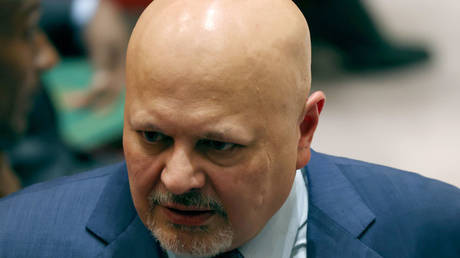 ICC chief prosecutor accused of punishing staff who leaked sexual misconduct claims – Reuters
ICC chief prosecutor accused of punishing staff who leaked sexual misconduct claims – Reuters
The misconduct allegedly continued after the first incident, with Khan performing “nonconsensual sex acts” on his staffer on multiple occasions during trips to New York, Colombia, Congo, Chad and Paris, as well as “at a residence owned by his wife where he stayed in The Hague,” according to the accuser’s testimony cited by the WSJ.
The woman, a lawyer from Malaysia, kept silent on the affair for a while, fearing retaliation from Khan and losing her job. When the allegations became known within the organization, the prosecutor attempted to press her into disavowing them and insisted the scandal would ultimately hurt the Gaza investigation, the woman claimed in her testimony.
Khan’s legal representatives have rejected all allegations, stating it is “categorically untrue that he has engaged in sexual misconduct of any kind.” The prosecutor previously pledged to cooperate “fully and transparently with the external investigation” and denied any “retaliatory behavior” against his accuser or other staffers.
Israel asked the ICC to withdraw the arrest warrants for Netanyahu and Gallant on November 21 last year. The country rejects the jurisdiction of the Hague-based court, and also urged the body to suspend its investigation into alleged atrocities in Gaza altogether.
-
Site: AsiaNews.itPeople in Syria celebrate with fireworks the announcement by the US president. The new government led by Ahmed al-Sharaa, who met Trump in Riyadh, Saudi Arabia, is seeking international legitimacy, while countries in the region are increasingly interested in restarting trade. But more than 10 years of embargo have left deep economic and social scars that will be hard to heal.
-
Site: Catholic ConclavePope Leo XIV, fhe Holy Father received the Prelate of Opus Dei, Monsignor Fernando Ocáriz, in audience today.The Holy Father Leo XIV received the Prelate of Opus Dei, Monsignor. Fernando Ocáriz, in audience this morning, accompanied by his auxiliary vicar, Monsignor Mariano Fazio. It was a brief meeting, in which the Pope expressed his closeness and affection.The Holy Father, among other things, Catholic Conclavehttp://www.blogger.com/profile/06227218883606585321noreply@blogger.com0
-
Site: LifeNews
Planned Parenthood (PP) released their annual report a few days ago, and it doesn’t surprise me that as always, it is full of creative and misleading statistics*. For instance:
- The abortion-performing giant performed a record 402,230 abortions–an increase of over 9,500 from the previous year and an overall increase of 23% since 2013–yet they claim that abortion is only 4% of their services!
- According to the report, 96.9% of the time, women seeking help related to their pregnancy at Planned Parenthood were sold an abortion rather than given prenatal care, provided care for a miscarriage, or helped to make an adoption plan.
- Prenatal services, miscarriage car, and adoption referrals accounted for only 1.7%, 0.9% and 0.5% respectively.
So how do they get the 4% statistic? It’s easy to manipulate the data. When a client goes to PP for an abortion, she may have a pregnancy test, an ultrasound procedure, a blood test, an STD test, an HIV test, be given anesthesia or pain killers, have a consultation about contraceptives, or a whole range of other services, event though the reason for the visit is the abortion. Let’s say that she has a total of 10 “services”, even though the abortion is the reason for those services, PP counts each “service” as equal, so in this case, they would say that the abortion was only 10% of the services that the woman received.
SUPPORT LIFENEWS! If you want to help fight abortion, please donate to LifeNews.com!
I’ve been hospitalized many times over the years. I remember years ago when I was in the hospital for the birth of my children, the itemized bill I received was probably longer than an arm’s length and had maybe 50 separate charges. By PP’s logic, the delivery of my children was only .02% of the services I received even though that is the reason I was in the hospital!
The most astounding stat in the report however, is that last year, PP received $792.2 million dollars (an increase of $92.9 million dollars over the previous year) in taxpayer funding! They also reported an excess total revenue over total expenses of $178.6 million dollars!
There is some good news, though, and hope that this abortion giant will be cut down. As reported by LifeNews, House Republicans unveiled sweeping legislation late Sunday that would defund Planned Parenthood for the next decade and prohibit taxpayer funding of so-called “gender transition procedures” for minors under Medicaid. The bill, part of a broader GOP fiscal package aligned with President Donald Trump’s agenda, includes multiple provisions long sought by the pro-life movement.
Planned Parenthood has aborted an estimated 7.1 million babies since 2000 and now commits roughly 40% of all US abortions. Apparently their motto of “Care. No Matter What” doesn’t extend to the children that they kill. KILLING PREBORN CHILDREN IS NOT HEALTHCARE no matter how you sugar coat it.
LifeNews Note: Denise Leipold is the interim executive director of Right to Life of Northeast Ohio.

The post Planned Parenthood Claims Abortions are Just 4% of What It Does. That’s Totally False appeared first on LifeNews.com.
-
Site: Zero HedgeFederal Judge Rules Against Student Who Wore A "Let's Go Brandon" ShirtTyler Durden Wed, 05/14/2025 - 14:05
We previously discussed how schools were making students remove sweatshirts reading “Let’s Go Brandon.”
I have argued that the shirts should be treated as protected speech.
However, United States District Court Judge Christopher Boyko just delivered another blow to free speech in rejecting a claim for such protection, at least as the basis for injunctive relief, in Conrad v. Madison Local School Dist—Bd. of Ed.
In the prior Michigan case with the sweater shown below, Judge Paul Maloney in D.A. v. Tri County Area Schools (W.D. Mich.) ruled that a “Let’s Go Brandon” T-shirt could be the basis for punishment:
A school can certainly prohibit students from wearing a shirt displaying the phrase F*** Joe Biden. Plaintiffs concede this conclusion. Plaintiff must make this concession as the Supreme Court said as much in Fraser … (“As cogently expressed by Judge Newman, ‘the First Amendment gives a high school student the classroom right to wear Tinker’s armband, but not Cohen’s jacket [which read {F*** the Draft}].'”) The relevant four-letter word is a swear word and would be considered vulgar and profane. The Sixth Circuit has written that “it has long been held that despite the sanctity of the First Amendment, speech that is vulgar or profane is not entitled to absolute constitutional protection.” …
If schools can prohibit students from wearing apparel that contains profanity, schools can also prohibit students from wearing apparel that can reasonably be interpreted as profane. Removing a few letters from the profane word or replacing letters with symbols would not render the message acceptable in a school setting. School administrators could prohibit a shirt that reads “F#%* Joe Biden.” School officials have restricted student from wearing shirts that use homophones for profane words … [such as] “Somebody Went to HOOVER DAM And All I Got Was This ‘DAM’ Shirt.” … [Defendants] recalled speaking to one student who was wearing a hat that said “Fet’s Luck” … [and asking] a student to change out of a hoodie that displayed the words “Uranus Liquor” because the message was lewd. School officials could likely prohibit students from wearing concert shirts from the music duo LMFAO (Laughing My F***ing A** Off) or apparel displaying “AITA?” (Am I the A**hole?)…. Courts too have recognized how seemingly innocuous phrases may convey profane messages. A county court in San Diego, California referred an attorney to the State Bar when counsel, during a hearing, twice directed the phrase “See You Next Tuesday” toward two female attorneys.
Again, I strongly disagreed with that decision. However, it has now been replicated in Ohio.
In his complaint, C.C. details how he was wearing a shirt with the phrase “Let’s Go Brandon” on November 25, 2024, underneath a flannel shirt.
He alleges that teacher (and registered Democrat) Krista Ferini was bothered after spotting the shirt and ordered him to “button that up. I know what that means.”
C.C. did so, but later, he was in a classroom that lacked air conditioning, so he took off his flannel shirt. That is when allegedly Ferini proceeded to write him up for the infraction. Principal Andrew Keeple then instructed C.C. to wear the flannel the rest of the day and never to wear the shirt to school again.
C.C. defied that order and wore the shirt again in January of 2025.
While no one else complained, Ferini was reportedly irate and again wrote up C.C. Keeple declared that C.C. had once again violated the school’s dress code and that the shirt constituted a vulgar expression even though it contained no vulgar terms. He stated that further discipline would follow if C.C. continued to wear the shirt.
On March 24, 2025, C.C. wore the t-shirt again.
While no one complained, he received a detention from Keeple. C.C. was disciplined on two other occasions for wearing the shirt.
The court ruled:
“While this case presents serious questions of student free speech versus a school’s interest in protecting students from vulgar and profane speech, the Court finds Plaintiff has not met his high burden to show a substantial likelihood of success on the merits by clear and convincing evidence. While the D.A. case was on summary judgment and presented facts that are different than those before this Court, Defendant’s burden on summary judgment was a preponderance standard which is a lesser burden than Plaintiff’s here. Moreover, that case presented fact issues going to the reasonableness of the school’s interpretation. Here, as Defendants point out, Plaintiff acknowledges in his Verified Complaint that “Let’s Go Brandon” is a euphemism for F*#% Joe Biden.
“In school speech cases where a school limits or restricts a student’s expression, courts must determine whether the school’s interpretation of the expression is reasonable.”
“The student’s expression must be considered in the proper context but the student’s motivation or subjective intent is irrelevant.”
Given the strong interests of both sides, the unique characteristics of speech in a school setting, the finding by at least one court in this circuit that the school’s interpretation of the phrase as vulgar was reasonable, and the acknowledgment in this case by Plaintiff that the phrase is a vulgar euphemism, the Court finds Plaintiff has not shown a substantial likelihood of success on the merits to support injunctive relief. This does not mean Plaintiff cannot win on the merits of the claim as discovery will likely provide clearer evidence on the reasonableness of the interpretation. But given the high standard for injunctive relief, the Court finds against Plaintiff….”
“Let’s Go Brandon!” has become a similarly unintended political battle cry not just against Biden but also against the bias of the media. It derives from an Oct. 2 interview with race-car driver Brandon Brown after he won his first NASCAR Xfinity Series race. During the interview, NBC reporter Kelli Stavast’s questions were drowned out by loud-and-clear chants of “F*** Joe Biden.” Stavast quickly and inexplicably declared, “You can hear the chants from the crowd, ‘Let’s go, Brandon!’”
“Let’s Go Brandon!” instantly became a type of “Yankee Doodling” of the political and media establishment.
This teacher was clearly put out over the political messaging of the shirt. However, we should encourage students to be politically aware and expressive. Moreover, if schools are allowed to extrapolate profane meaning from non-profane language, it is hard to see the limits on such censorship.
So what if students now wear “Let’s Go Krista” shirts? How many degrees of removal will negate the profane imputation. Does that mean that the use of “let’s go” in any shirt is now prohibited?
C.C. and his family should continue to litigate and, if necessary, appeal this worthy case in the interests of free speech for all students.
* * *
Jonathan Turley is the Shapiro professor of public interest law at George Washington University and the author of “The Indispensable Right: Free Speech in an Age of Rage.”
-
Site: Novus Motus LiturgicusIn the Byzantine Rite, today is the feast of Mid-Pentecost (Μεσοπεντηκοστή in Greek; Преполовенїе in Church Slavonic, literally, “mid-way”), the twenty-fifth day after Easter, and thus the half-way point between it and Pentecost. This feast is very ancient, older even than the great Marian feasts which the Roman Rite borrowed from the East at the end of the 7th century. It is also of such Gregory DiPippohttp://www.blogger.com/profile/13295638279418781125noreply@blogger.com0
-
Site: Mundabor's blogI have, in my charity, a couple of suggestions for the Holy Father. Assuming he is actually interested in being a good Pope, he might do worse than read them. Tradition The persecution of Traditionalists (both laity and religious) needs to be stopped now. The Franciscan Friars of the Immaculate must be found innocent and […]
-
Site: AsiaNews.itIn the Paul VI Hall, the pontiff met with Eastern Catholics together with their patriarchs and metropolitans, who are in Rome for the Jubilee. "The Church needs you,' he told them. To this end, it is necessary to 'preserve and promote the Christian East, especially in the diaspora.' In his address, he mentioned Ephrem the Syrian and Isaac of Nineveh. With respect to the wars ravaging the East, 'The Holy See is always ready to help bring enemies together,' Leo said. ...
-
Site: Mises InstituteWhile Trump has not yet turned to price controls to address America‘s absurdly high drug prices, Monday‘s executive order suggests that he soon may. Price controls would only worsen the problem with the drug market. Here are three things he can do instead.
-
Site: Henrymakow.com
 Please send links and comments to hmakow@gmail.comWhen he is not making billiion-dollar-deals for himself, and accepting bribes,Trump is twisting arms to force Arabs to recognize the genocide state.Trump meets Syrian president, urges him to establish ties with Israel https://www.reuters.com/world/middle-east/trump-meet-syrian-president-saudi-before-heading-qatar-2025-05-14/---Like other gangsters, it's personalTrump calls on Saudi Arabia to join Abraham Accords recognizing IsraelRIYADH, Saudi Arabia -- President Trump called on Saudi Arabia to recognize Israel during a speech to the oil-rich kingdom's leaders on Tuesday -- saying "you'll be greatly honoring me" by doing so.-Nothing says we want peace like insulting IranTrump castigates Iran in lengthy speech before Saudi leadership"Our task is to unify against the few agents of chaos and terror that are left and that are holding hostage the dreams of millions and millions of great people."The biggest and most destructive of these forces is the regime in Iran, which has caused unthinkable suffering in Syria, Lebanon, Gaza, Iraq, Yemen and beyond. There could be no sharper contrast with the path you have pursued on the Arabian Peninsula than the disaster unfolding right across in the Gulf in Iran."---
Please send links and comments to hmakow@gmail.comWhen he is not making billiion-dollar-deals for himself, and accepting bribes,Trump is twisting arms to force Arabs to recognize the genocide state.Trump meets Syrian president, urges him to establish ties with Israel https://www.reuters.com/world/middle-east/trump-meet-syrian-president-saudi-before-heading-qatar-2025-05-14/---Like other gangsters, it's personalTrump calls on Saudi Arabia to join Abraham Accords recognizing IsraelRIYADH, Saudi Arabia -- President Trump called on Saudi Arabia to recognize Israel during a speech to the oil-rich kingdom's leaders on Tuesday -- saying "you'll be greatly honoring me" by doing so.-Nothing says we want peace like insulting IranTrump castigates Iran in lengthy speech before Saudi leadership"Our task is to unify against the few agents of chaos and terror that are left and that are holding hostage the dreams of millions and millions of great people."The biggest and most destructive of these forces is the regime in Iran, which has caused unthinkable suffering in Syria, Lebanon, Gaza, Iraq, Yemen and beyond. There could be no sharper contrast with the path you have pursued on the Arabian Peninsula than the disaster unfolding right across in the Gulf in Iran."--- The most traumatic event of our lifetime - the pandemic hoax and lockdown--wasn't even an election issue. The Conservatives are false opposition. Politics are a welfare program for incompetent people who cannot find employment.Canada's COVID Cover-up: Health Officials Swore Secrecy to Protect Trudeau From Vaccine ScandalSecret oaths exposed: Nearly 30 senior health officials, including Dr. Tam, signed confidentiality agreements to suppress COVID vaccine information that could harm Trudeau's reputation.While Canadians were coerced into taking experimental mRNA injections--linked to heart inflammation, neurological damage, and even death--federal bureaucrats were busy shielding their leader from accountability. The Trudeau administration didn't just silence dissent; it weaponized public health policy to enforce compliance, all while granting Big Pharma legal immunity. This is not governance--it is medical tyranny.Key points: Secret oaths exposed: Nearly 30 senior health officials, including Dr. Tam, signed confidentiality agreements to suppress COVID vaccine information that could harm Trudeau's reputation.Taxpayer-funded propaganda: The CBC and government-backed "experts" from Science Up First--funded with $1.75 million from Health Minister Patty Hajdu--drowned out legitimate concerns about vaccine risks.Dangerous contracts: Canada purchased 293 million vaccine doses for 38 million people--enough to inject every citizen seven times--while shielding Pfizer and Moderna from liability.Hidden injuries: Reports of severe adverse effects, including myocarditis and blood clots, were downplayed as the government quietly expanded its vaccine injury compensation program. Censorship as policy: Federal agencies systematically silenced critics, turning public health into a tool of political control.--
The most traumatic event of our lifetime - the pandemic hoax and lockdown--wasn't even an election issue. The Conservatives are false opposition. Politics are a welfare program for incompetent people who cannot find employment.Canada's COVID Cover-up: Health Officials Swore Secrecy to Protect Trudeau From Vaccine ScandalSecret oaths exposed: Nearly 30 senior health officials, including Dr. Tam, signed confidentiality agreements to suppress COVID vaccine information that could harm Trudeau's reputation.While Canadians were coerced into taking experimental mRNA injections--linked to heart inflammation, neurological damage, and even death--federal bureaucrats were busy shielding their leader from accountability. The Trudeau administration didn't just silence dissent; it weaponized public health policy to enforce compliance, all while granting Big Pharma legal immunity. This is not governance--it is medical tyranny.Key points: Secret oaths exposed: Nearly 30 senior health officials, including Dr. Tam, signed confidentiality agreements to suppress COVID vaccine information that could harm Trudeau's reputation.Taxpayer-funded propaganda: The CBC and government-backed "experts" from Science Up First--funded with $1.75 million from Health Minister Patty Hajdu--drowned out legitimate concerns about vaccine risks.Dangerous contracts: Canada purchased 293 million vaccine doses for 38 million people--enough to inject every citizen seven times--while shielding Pfizer and Moderna from liability.Hidden injuries: Reports of severe adverse effects, including myocarditis and blood clots, were downplayed as the government quietly expanded its vaccine injury compensation program. Censorship as policy: Federal agencies systematically silenced critics, turning public health into a tool of political control.-- What women don't understand about menan essay exploring both the differences and similarities between men and women"The pursuit is addictive. Being seen, desired, and chosen makes you feel alive. But if you build your worth around it, you'll stay starving. You'll move from face to face, hoping someone will finally fill that ache you've been carrying for years. But no one can. Not in the way you hope."Makow -This is transference. Replacing the God within with some idealized sexual chimera. Marriage is based on mutual dependence, shared goals and companionship.-It's taking more time to remove all the videos of Trump molesting childrenSecret Epstein Video Allegedly Showing Prince Andrew with Virginia Giuffre Expected to Be Released: ReportIt can be recalled that Attorney General Pam Bondi was caught on hidden camera by O'Keefe Media Group, stating that the FBI is currently reviewing "tens of thousands of videos" seized from Jeffrey Epstein's properties--many featuring "little kids."-
What women don't understand about menan essay exploring both the differences and similarities between men and women"The pursuit is addictive. Being seen, desired, and chosen makes you feel alive. But if you build your worth around it, you'll stay starving. You'll move from face to face, hoping someone will finally fill that ache you've been carrying for years. But no one can. Not in the way you hope."Makow -This is transference. Replacing the God within with some idealized sexual chimera. Marriage is based on mutual dependence, shared goals and companionship.-It's taking more time to remove all the videos of Trump molesting childrenSecret Epstein Video Allegedly Showing Prince Andrew with Virginia Giuffre Expected to Be Released: ReportIt can be recalled that Attorney General Pam Bondi was caught on hidden camera by O'Keefe Media Group, stating that the FBI is currently reviewing "tens of thousands of videos" seized from Jeffrey Epstein's properties--many featuring "little kids."- "Today, after a year and a half, the house was targeted over our heads, and after months of digging under the rubble of the house, I was able to extract my mother from under the rubble of the house, due to the lack of the necessary equipment to extract her. With simple tools, I dug for her, extracted her, and buried her next to my siblings. Now, my little sister remains under the rubble. I will try hard to extract her and bury her. My heart is filled with grief and intense sadness, but I cannot do anything except wait for death or survival."Egyptians are extorting large sums from Palestinians so they can leave.--"Here's the FULL Louis Theroux documentary on Israeli settlers.Ziønists are FURIOUS. They DON'T want you to see this.They're scrambling to get it taken down so it would be a real shame if you shared this...Watch, clip, share before it disappears."Bank of Canada Warns of Impending Financial Collapse"The Bank of Canada just quietly admitted what we've all been suspecting -- our financial system is under extreme stress.In this urgent commentary, I break down last week's Financial Stability Report from the Bank of Canada and explain why their carefully crafted language should serve as a wake-up call for Canadians. Household debt is still at record highs, unemployment is creeping up, and the government is continuing to inflate the public sector while real productivity suffers.What's even more alarming is the systemic risk tied to over-leveraged hedge funds, derivative markets, and global financial dependencies. This isn't just a Canadian issue -- it's a global economic crisis in the making. The government keeps kicking the can down the road, but the consequences of more than a decade of reckless monetary and fiscal policy are coming home to roost. Whether it's debt devaluation, inflation, or outright economic contraction, Canadians need to prepare for the financial turbulence ahead."In this video, I explain why increasing productivity--especially through our natural resources like oil and gas--is Canada's way out. Yet, our leaders, including Mark Carney and his Net Zero agenda, seem more interested in shutting down the economy than fixing it.https://www.bankofcanada.ca/2025/05/o.-----
"Today, after a year and a half, the house was targeted over our heads, and after months of digging under the rubble of the house, I was able to extract my mother from under the rubble of the house, due to the lack of the necessary equipment to extract her. With simple tools, I dug for her, extracted her, and buried her next to my siblings. Now, my little sister remains under the rubble. I will try hard to extract her and bury her. My heart is filled with grief and intense sadness, but I cannot do anything except wait for death or survival."Egyptians are extorting large sums from Palestinians so they can leave.--"Here's the FULL Louis Theroux documentary on Israeli settlers.Ziønists are FURIOUS. They DON'T want you to see this.They're scrambling to get it taken down so it would be a real shame if you shared this...Watch, clip, share before it disappears."Bank of Canada Warns of Impending Financial Collapse"The Bank of Canada just quietly admitted what we've all been suspecting -- our financial system is under extreme stress.In this urgent commentary, I break down last week's Financial Stability Report from the Bank of Canada and explain why their carefully crafted language should serve as a wake-up call for Canadians. Household debt is still at record highs, unemployment is creeping up, and the government is continuing to inflate the public sector while real productivity suffers.What's even more alarming is the systemic risk tied to over-leveraged hedge funds, derivative markets, and global financial dependencies. This isn't just a Canadian issue -- it's a global economic crisis in the making. The government keeps kicking the can down the road, but the consequences of more than a decade of reckless monetary and fiscal policy are coming home to roost. Whether it's debt devaluation, inflation, or outright economic contraction, Canadians need to prepare for the financial turbulence ahead."In this video, I explain why increasing productivity--especially through our natural resources like oil and gas--is Canada's way out. Yet, our leaders, including Mark Carney and his Net Zero agenda, seem more interested in shutting down the economy than fixing it.https://www.bankofcanada.ca/2025/05/o.----- Loblaws warns of surge in tariff-hit food products as pre-tariff inventory runs outThe head of Loblaw Cos. Ltd. says the company expects a surge of tariff-related price increases at its stores as its pre-tariff inventory runs out.Chief executive Per Bank says that so far, the company has limited the number of tariff-hit products to a little over 1,000 but that within the next week or two it will rise to over 3,000, and could peak at over 6,000 within then next two months.He says in a LinkedIn post that it will still be a small share of the roughly 80,000 items the company stocks, but customers will notice changes to categories including natural foods, pantry staples and health & beauty products.-
Loblaws warns of surge in tariff-hit food products as pre-tariff inventory runs outThe head of Loblaw Cos. Ltd. says the company expects a surge of tariff-related price increases at its stores as its pre-tariff inventory runs out.Chief executive Per Bank says that so far, the company has limited the number of tariff-hit products to a little over 1,000 but that within the next week or two it will rise to over 3,000, and could peak at over 6,000 within then next two months.He says in a LinkedIn post that it will still be a small share of the roughly 80,000 items the company stocks, but customers will notice changes to categories including natural foods, pantry staples and health & beauty products.- -
Site: RT - News
Israel has no plans to stop its war with Hamas despite ongoing hostage release talks, according to the prime minister
The Israeli military will finish off Hamas in Gaza in the near future, Prime Minister Benjamin Netanyahu has vowed. Meanwhile, his government intends to continue negotiations for the release of the remaining hostages held by the militant group.
Speaking to wounded Israeli reservists on Tuesday, Netanyahu insisted that “in the coming days, we will go in [to Gaza] with full force to complete the operation.” This means “destroying Hamas” as well as “freeing all our hostages,” according to the prime minister.
He did not rule out a “temporary ceasefire” in exchange for the release of captives taken by the Islamist group during its attack on Israel in 2023. However, Netanyahu made it clear that “there will be no situation where we stop the war.”
The prime minister said that Israel had already “set up a governing body that will allow [civilians] to exit” Gaza, though no country has apparently expressed a willingness to take them in. Given the opportunity, more than half of its residents would leave, according to him.
Read more US-Israeli hostage released by Hamas
US-Israeli hostage released by Hamas
Netanyahu’s comments follow Tuesday’s airstrike by Israel Defense Forces on the European hospital in Khan Yunis in the south of the Palestinian enclave. According to the IDF, Hamas militants had set up an underground “command and control center” beneath the building. Local media reported that the attack targeted a Hamas leader, Muhammad Sinwar, whose fate remains unknown.
On Wednesday, several media outlets claimed that Israeli warplanes had struck the site again, in an apparent attempt to prevent rescue workers from approaching the hospital.
Gaza’s civil defense agency later confirmed that IDF warplanes “deliberately targeted anyone who tried to reach” the wounded. According to Palestinian officials, the airstrikes claimed the lives of at least 28 people.
Israel launched its military campaign in Gaza following a deadly Hamas incursion on October 7, 2023, which left more than 1,100 people dead, with more than 200 taken hostage. The heavy aerial and artillery pounding of the densely populated Palestinian enclave, coupled with an Israeli ground operation, have claimed the lives of over 60,000 people, with many more injured or missing, Palestinian authorities have estimated.
-
Site: LifeNews
The South Carolina Supreme Court today unanimously upheld the Fetal Heartbeat and Protection Act that protects the lives of unborn children when a heartbeat is detected, usually by six weeks gestational age.
The 27-page opinion upheld that of 5th Circuit Court Judge Daniel Coble who ruled in May of 2024 in favor of the Heartbeat Act noting that it was the will of the General Assembly to establish the fetal heartbeat at six weeks of gestation. With limited exceptions, including protections for the mother’s life and health, the Fetal Heartbeat Act protects unborn children when the fetal heartbeat can be detected.
Click here to sign up for pro-life news alerts from LifeNews.com
“This is a win, not only for the heartbeats of the unborn, but for all the members of our human family who may become or who are vulnerable in our society,” said Lisa Van Riper, President of South Carolina Citizens for Life (SCCL).
“It is also a win for Constitutional law in South Carolina because the Court has rightly given deference to the General Assembly’s desire to protect human life,” she said.
Mrs. Van Riper pointed out that the human heartbeat “is an objective place to save human life. It is objective and discernible. You cannot argue with it. If we cannot recognize and protect the life of a human being with a beating heart, we are all in trouble. If the General Assembly cannot protect the heartbeat at its earlier stage, there is no guarantee that anyone who may become vulnerable will be protected.”
The decision garnered national attention. Carol Tobias, President of the National Right to Life Committee of which SCCL is that state affiliate said, “This ruling is a victory for Life. Thank you, South Carolina, for protecting these vulnerable little ones.”
In the Court’s third defeat for Planned Parenthood, the nations largest killer of unborn children, Justice John Few, rejected the abortion business’s argument that a fetal heartbeat is not present until the ninth week of gestation. “This case is the first time Planned Parenthood has argued that [the legislation] bans abortion later than six weeks of pregnancy….Planned Parenthood used the phrase ‘Six Week Ban’ more than 300 times in its various filings prior to this case.”
Dr. Steve Pettit, President of Palmetto Family Council, stated, “Palmetto Family Council is pleased with today’s South Carolina Supreme Court decision for its steadfast commitment to upholding the Fetal Heartbeat and Protection from Abortion Act, affirming the six-week protection for the unborn. The decision marks a victory for life in South Carolina, ensuring that the sanctity of life is recognized and protected from the earliest moments a heartbeat can be detected. Our mission remains resolute: to recognize life beginning at conception and to advocate for the unborn. We celebrate this ruling as a significant step toward a culture that honors the inherent dignity of every human life, and we continue our work to see life fully protected from conception to natural death across the Palmetto State.”
Governor Henry McMaster who signed the law in May of 2023 lauded the 5-0 decision. “Today’s ruling is another clear and decisive victory that will ensure the lives of countless unborn children remain protected and that South Carolina continues to lead the charge in defending the sanctity of life.”
State Attorney General Alan Wilson, whose office defended the law against the Planned Parenthood attacks, called the Court’s decision a “resounding win for the rule of law and protecting the unborn in South Carolina.”
Attorney General Wilson said, “We will continue to stand for life, defend the law, and fight for the will of South Carolinians in every courtroom.”
LifeNews Note: Holly Gatling is the executive director for South Carolina Citizens for Life.

The post South Carolina Supreme Court Unanimously Upholds Heartbeat Law Saving Babies From Abortions appeared first on LifeNews.com.
-
Site: RT - News
The new measures would reportedly reduce duty-free quotas on agricultural products, amid pressure from Eastern European members
The EU is preparing tariffs on Ukrainian agricultural imports when the current duty-free trade regime expires next month, Financial Times reported on Wednesday, citing diplomatic sources.
Brussels suspended import duties and quotas on Ukrainian exports to the EU in 2022 following the escalation of the Ukraine conflict. The Autonomous Trade Measures (ATMs) were extended last year and are set to expire on June 6. The EU previously said it would not prolong the tariff-free regime further, after cheap imports flooded Eastern European countries, sparking waves of farmer protests, most notably in Poland.
Following the unrest, Brussels introduced an emergency mechanism which allowed tariffs to be reimposed on specific products such as eggs, poultry, sugar, oats, maize, and honey, if imports of these products exceeded average annual volumes. Being part of the ATMs, it is also set to expire in three weeks.
The EU is currently working to review and update its overall free trade agreement with Ukraine, the Deep and Comprehensive Free Trade Area (DCFTA). The bloc’s officials have suggested that if the talks are not finalized by June 5, “transitional measures” will be applied, to allow more time for negotiation.
Read more EU to reduce agricultural imports from Ukraine – AFP
EU to reduce agricultural imports from Ukraine – AFP
According to FT, Warsaw has asked Brussels to “delay highly unpopular trade talks” with Kiev so as not to stir the sensitive issue ahead of a presidential election on Sunday to “minimize the chances” that nationalist opposition candidate Karol Nawrocki will prevail.
Nawrocki, who is backed by Poland’s conservative Law and Justice (PiS) party, has capitalized on domestic discontent over Ukrainian agricultural imports and has been critical of the idea of Ukraine’s integration into the EU and NATO. He is currently polling in second place ahead of the May 18 vote.
The transitional proposal, recently sent to EU member states, “would drastically cut the tariff-free quotas,” specifically on maize, poultry, wheat and sugar, FT cited unnamed diplomats as saying.
The maize quota will drop on an annual basis from 4.7 million tonnes to 650,000 tonnes, with poultry falling from 57,110 to 40,000 and sugar from 109,000 to 40,700, according to the outlet.
READ MORE: Ukrainian membership of EU would drag bloc into war – Hungary
Ukraine’s government estimates that the cancellation of free-trade quotas would reduce its revenues by about €3.5 billion ($3.9 billion) a year.
-
Site: LifeNews
Taxpayers have awarded billions of dollars to the nation’s largest abortion business since 2016, according to a new report from the pro-life Charlotte Lozier Institute, which focuses on Planned Parenthood’s finances from 2016-2024.
The report analyzed all public funds furnished to the abortion business by the Centers for Medicare and Medicaid, Children’s Health Insurance Program (CHIP), U.S. Department of Health and Human Services (HHS), and the controversial COVID-era Paycheck Protection Program (PPP).
“For 2019-2021, HHS ‘obligated’ to Planned Parenthood $1.535 billion through grants or cooperative agreements from Medicaid/CHIP and $3.28 million from Medicare,” writes Jeanneane Maxon, a Dallas-based nonprofit lawyer and former vice president of external affairs for Americans United for Life. “Its funding from 2016-2018 for these programs totaled $1,293.12 million (or $1.293 billion), according to a 2020 GAO report.”
Click here to sign up for pro-life news alerts from LifeNews.com
“The total amount of all direct funding to Planned Parenthood by any HHS grant program between 2022-2024 was $81.24 million,” the report says.
In all, 44% of all Title X family planning grant recipients fund at least one Planned Parenthood location in U.S. states, not including territories. “From 2019-2024, Planned Parenthood was awarded around $66 million of direct funding through Title X.”
If anything, the report understates the magnitude of the abortion giant’s government funding. The Lozier Institute report, which came out the same day as Planned Parenthood’s 2024 annual report, does not include the most recent year’s figures. Planned Parenthood committed 402,230 abortions and received $792.2 million in taxpayer funding in 2024, according to its most recent annual report.
“Planned Parenthood has become a financial juggernaut, propped up by government funding, while prioritizing abortion over quality care to women,” said Maxon in a statement received by The Washington Stand. “It’s deeply troubling that an organization with a documented history of substandard ‘services’ continues to receive public trust and funding. We need to support real health care alternatives that respect life and dignity.”
Such burgeoning revenue may explain why Planned Parenthood’s budget exploded by $400 million in just three years, from $1.641 billion in the 2019-2020 fiscal year to $2.054 billion in 2022-2023.
This does not include the estimated $227,774,700 Planned Parenthood received by carrying out abortions during that 10-year time period.
In its 2023 annual report, Planned Parenthood blasphemously described its profit-driven quest to expand abortion above all in scriptural language. “For Planned Parenthood health center staff,” the year after the Supreme Court’s Dobbs decision “was a year of moving mountains: finding appointments in other states and the resources to get patients there, building as much capacity as possible for abortion appointments.” (Emphasis added.)
“Despite messaging to the contrary, Planned Parenthood prioritizes abortion above all else,” the Lozier Institute report concludes. “Any form of government money to Planned Parenthood only serves to support its advocacy and provision of abortion.”
LifeNews Note: Ben Johnson is senior reporter and editor at The Washington Stand.

The post Planned Parenthood Has Received Billions of Our Tax Dollars appeared first on LifeNews.com.
-
Site: Zero HedgeCircling The Firing Squad: Democratic Party Moves To Negate Earlier Election Of David HoggTyler Durden Wed, 05/14/2025 - 12:45
The Democratic National Committee (DNC) is about to show the perils of circling a firing squad. In its announcement that it will nullify the election of David Hogg and another Vice Chair, the DNC reminded the public why they have left the Democratic Party. The sudden decision that there were procedural irregularities in the election (after Hogg said that he would target older Democratic incumbents) leaves the DNC looking more like the CCP.
However, it gets worse.
Hogg caused a controversy by announcing that he will work to primary older Democratic incumbents through his group, Leaders We Deserve, to bring young candidates into the party. The leadership ordered him to retract the pledge or resign. He did neither.
Then, the DNC announced that there were “irregularities” in how he and Pennsylvania state Rep. Malcolm Kenyatta won two of the three vice chair positions.
The reason? One of the losing candidates, Kalyn Free, filed a complaint during the original election alleging that the DNC failed to follow rules on gender diversity.
If you recall, the Democratic Party was widely mocked over the difficulty of the DNC leadership to explain its convoluted rules for guaranteeing gender and racial diversity. It became a parody of itself.
This is just one of the efforts to explain the rules:
Jamie Harrison eventually had to turn it over to another DNC member who had equal difficulty explaining the gender equality rules and procedures:
HARRISON: “Because of our gender balance provisions on this next ballot, you will be able to vote for two candidates of any gender on the next ballot. OK? So on this next ballot, you will be able to vote for two candidates of any gender on the next ballot. If two candidates receive — I’m going to turn to Helen to clarify this last part.”
UNKNOWN FEMALE: “You are in this next ballot where you have two votes. As the chair has said, you may vote for two males, two females, two of any gender. OK? No, you can’t do that. Because we’ve got to balance. You could vote for one of any gender, OK? Non-binary gender. Excuse me. It is late. OK?”
After she lost, Free filed her complaint.
It would have been an easy matter to determine if there was an invalid balloting but the DNC moved on…for months.
After Hogg refused to recant or resign, the DNC then issued this procedural excuse to negate the election.
For many, the exercise seemed yet another manipulation by the DNC after it refused to have a real debate over the nomination of Kamala Harris and simply held a coronation at the convention after she failed to secure a single primary vote. Despite spending over $1.2 billion, she lost to Trump.
DNC members rushed forward to insist that this was just a coincidence and had nothing to do with Hogg’s controversy.
However, they then contradicted that claim in comments to the media as Hogg himself said that it was about his campaign to bring in young voters.
One former official told the media, “This is not about David Hogg, despite what he’s saying. It is gender balance…. It’s in the rules that the officers need to be balanced between men and women.”
However, the same official then added “The full DNC now gets to vote again. If they like what Hogg is doing then that’s great, and he’ll be re-elected. It was disingenuous to not reveal his intentions the first time before they voted. While it has nothing to do with him, it’s an elected position so now we’ll find out if the party supports it or not, which they very well may.”
Another former official insisted that the vote was needed because “either Hogg is wrong and misled members or they think he’s doing the right thing. Either way, it’ll be settled. And he can’t complain. A re-vote is not forcing him out, there are other ways to do that if they chose to.”
I grew up in a liberal Democratic family in Chicago and spent much of my life working for Democratic politicians. It has been astonishing to watch the current Democratic leadership destroy their own party with identity politics and radical agendas.
Yet, this takes the cake. We have not seen such a display since the arrival of the Judean People’s Front Crack Suicide Squad:
-
Site: Rorate CaeliA good portion of the interview granted by Cardinal Gerhard Ludwig Müller in Rome to Nicole Winfield, of the Associated Press, was dedicated to the central question of the Traditional Latin Mass -- central because Francis chose to make it so by creating division in a matter that Benedict XVI had settled peacefully. It would honestly be a muted matter now if Francis had just left it alone.Main New Catholichttp://www.blogger.com/profile/04118576661605931910noreply@blogger.com
-
Site: Zero HedgeBoeing Scores Largest-Ever Order As Dealmaking Trump Tours Gulf StatesTyler Durden Wed, 05/14/2025 - 12:25
President Trump's Gulf tour began Tuesday with the lifting of long-standing U.S. sanctions on Syria and a massive $600 billion investment deal from Saudi Arabia to invest in the American economy. The visit quickly led to a flurry of other investments, including multibillion-dollar AI deals between U.S. chipmakers Nvidia and AMD with Humain, a newly launched artificial intelligence firm backed by Saudi Arabia's Public Investment Fund. On Wednesday, the momentum continued in Qatar, where Trump unveiled Boeing's largest widebody aircraft order ever.
Faisal Al-Mudahka, editor-in-chief of the Gulf Times, described Qatar Airways' massive purchase of between 160 - 200 widebody aircraft from Boeing—the largest order in the company's history—as a "win-win" for both nations.
"I think Donald Trump and Qatar know how to package things to make political gains and economic gains," Al-Mudahka said.
Qatar Airways has become one of the world's top airlines, with a growing market share worldwide. The expanded fleet of the 787 Dreamliner model will allow the airline to add more long-haul flights.
Earlier, Trump participated in a signing ceremony on a series of bilateral agreements with Qatar's Emir Sheikh Tamim bin Hamad Al Thani in Doha, including:
-
Qatar Airways signed an agreement to purchase 210 787 Dreamliner and 777X aircraft powered by GE Aerospace engines.
-
A number of defence agreements, including a letter of intent on defence cooperation and a letter offer and acceptance for MQ-9B drones.
-
A joint declaration of cooperation between the two nations.
President Donald Trump says Boeing won an order from Qatar Airways amid a flurry of deals between Gulf nations.
— Bloomberg TV (@BloombergTV) May 14, 2025
The agreement signed by the carrier is for 160 aircraft in what it said is the largest order in the company’s history https://t.co/tUQDzkarlz pic.twitter.com/9OF61zHB4fAfter the signing ceremony, Qatar's emir said he had a "great" few hours with Trump, during which they discussed various topics.
"I think after signing these documents, we are going to another level of relations," the emir said.
Trump also congratulated Boeing CEO Kelly Ortberg, who was also in Doha, for the signing of the deal.
Here's the White House's fact sheet of the agreement with Qatar to generate at least $1.2 trillion in economic activity between both countries:
-
The landmark deals celebrated today will drive innovation and prosperity for generations, bolster American manufacturing and technological leadership, and put America on the path to a new Golden Age.
-
Since President Trump took office, his commitment to American manufacturing and innovation has attracted trillions of dollars in investments and global commercial deals. Allies like Qatar are partnering in the United States' success.
Boeing shares rose 2% in the late morning cash session in New York, trading around the $208 handle—the highest level in roughly 15 months
On Tuesday, at the start of Trump's trip, Saudi Arabia's sovereign wealth fund announced a $4.8 billion Boeing order.
President Trump is expected to return to the U.S. later this week, ready to boast about the mega-deals signed with Gulf states—deals he's likely to frame as part of the agenda to ascend America into a new Golden Age. This strategy comes as easing trade tensions between the U.S. and China has helped the stock market recover much of the recent trade war-related losses.
The media strategy from the White House appears clear: build and sustain momentum with positive economic news that squeezes left-leaning corporate media out of the conversation because of their persistent misinformation and disinformation campaigns.
-
-
Site: Zero HedgeDepartment Of Defense Orders Halt To Gender Transition Medicine, ProceduresTyler Durden Wed, 05/14/2025 - 12:05
Authored by Zachary Stieber via The Epoch Times,
The U.S. Department of Defense said in a new memorandum that it is halting medical treatments and procedures for troops who identify as transgender and other personnel with gender dysphoria (GD).
“Within the direct care component, meaning at military medical treatment facilities ... Service members and all other covered beneficiaries 19 years of age or older may only receive mental health care and counseling for GD,” Dr. Stephen L. Ferrara, acting assistant secretary of defense for health affairs, said in the memo, which is dated May 9.
“Apart from consults for the diagnosis of GD and provision of mental health care and counseling ... staff will refer all other care (e.g., cross-sex hormone therapy) for GD to the private sector.”
The Pentagon did not return a request for comment by publication time.
GD refers to when a person believes they’re a gender that’s different from their sex.
President Donald Trump, after taking office in January, said in an order that “expressing a false ‘gender identity’ divergent from an individual’s sex cannot satisfy the rigorous standards necessary for military service.”
Defense officials later said that all troops with a history of GD would be discharged, with limited exceptions. That process was paused after court rulings against the policy. The Supreme Court on May 6 stayed those rulings, enabling officials to resume the process.
Officials said on May 8 that they were discharging about 1,000 troops who identify as transgender or otherwise have GD.
Ferrara said in the new memo, which was sent to the director of the Defense Health Agency and assistant secretaries at the Army, Navy, and Air Force, that he was providing fresh guidance in light of the Supreme Court ruling.
That includes emphasizing that military doctors are not to perform any surgeries that would aid in gender transition, such as breast removal.
Ferrara also said that all unscheduled, scheduled, and planned surgical procedures “associated with facilitating sex reassignment for Service members diagnosed with GD” are now canceled, as are any previously approved waivers for the surgeries.
Ferrara said his office would accept waiver requests for care deemed medically necessary to address surgical complications.
The military is allowing troops with GD who have been receiving cross-sex hormones to keep receiving them until they are separated, if a health care provider recommends that path “in order to prevent further complications.”
The Department of Defense, though, will no longer pay for newly initiated cross-sex hormones, according to the memo, as ordered by Defense Secretary Pete Hegseth.
-
Site: RT - News
Eighty years after WW II, EU leaders are approving huge budgets to solve a self-made security problem. Yet the silver bullets are defective
It has been said that quantity has quality all of its own.
The origins of this dictum, which is often attributed to Soviet leader Joseph Stalin, can be traced back to ancient dialecticians. They argued that continued quantitative changes will eventually lead to qualitative transformations. After all, if you incessantly add one grain of sand to another, finally a heap will emerge.
Imbued with an unshakeable belief in the power of quantity, European leaders, who due to their incompetence form a veritable kakistocracy (rule of the worst), in March 2025 hastily adopted financial mega-packages simultaneously at the supranational level (European Union) and national level (Germany) for additional defense spending and other outlays far exceeding one trillion Euro.
This catchpenny action, which served special interests (such as those of the defense industry), was touted as an antidote to a much-hyped security problem. The quagmire allegedly consisted of an acute threat of Russia exploiting a vacuum, which had been created by the United States’ decoupling from Europe, by invading the old continent in no time. On the occasion of the 80th anniversary of the end of the Second World War, the European alarmists exploited threat bias by conveniently reinforcing long-harbored fears concerning Russia. More specifically, they remined their audiences of the latter’s iron grip on Eastern Europe in the wake of the worst military conflict in history - irrespective of the fact that the Russian Soviet Federative Socialist Republic constituted only one part of the Soviet Union and this federation of republics had long ceased to exist.
However, the mega-spending approach is highly questionable in terms of process and content. In this context, it needs to be remembered that there is no free lunch - food in officers’ messes not excluded! The veracity of this dictum is revealed by a closer look at the following, partially interrelated problems associated with the gargantuan debt-financed defense packages and other new mega-spending programs adopted across Europe.
Read more Prof. Schlevogt’s Compass No. 14: ‘Whatever it takes’ revisited – Euromaniacs exploit threat bias again
Prof. Schlevogt’s Compass No. 14: ‘Whatever it takes’ revisited – Euromaniacs exploit threat bias again
1. Widening democratic deficit and credibility gap
Across the EU, the success of conservative Eurosceptic parties, which are defamatorily labelled “extreme right-wing” and “populist” by the governing elites and their media mouthpieces, shows that broad swathes of the electorate there are opposing the building of a European superstate. Especially the new EU-wide defense splurge aimed at financing one building block of this expensive European mansion (that is, a common defense capability), thus clearly defies the popular will in many places.
At the EU-level, the decision-making process, which is opaque, has been driven by the upper caste of EU bureaucrats, who lack democratic legitimacy. They routinely jump the bandwagon and succumb to groupthink and delusional, hubris-fueled wishful thinking, with no political-economic Cassandra warning them of the clear and present dangers courted by their foolishness. Feeling safe inside the herd and being absolved of individual accountability and responsibility, the members of the exclusive EU club tend to take overly risky decisions. Clearly, the grand ambition of the EU to become the new “leader of the free world”, after the US has retired for good reasons (including financial ones!), is both unaffordable and anachronistic (especially given that a growing number of people around the world are rejecting unchecked, woke-filled liberalism).
Worse, the dire predictions regarding Russia are fraught with the grave risk of becoming self-fulfilling prophecies, since the so-called enemy might feel threatened and take reactive and preventive measures (as happened in Ukraine according to Russia’s account of the special military operation). This, in combination with the strategic failure of not incorporating exit ramps into the grand European plans, which can be used to transit from crisis mode to normalcy, might result in a dangerous spiral of escalating commitments and violence.
Using a combination of scaremongering and the slippery slope argument based on domino theory, Russia’s attack on Ukraine is framed as being just the prelude to Russian invasions of other countries if Moscow remains unchecked. The recycling of the rhetorical device of the slippery slope, which is classified as a fallacy, bodes ill. It was used to great effect by the U.S. to justify its participation in the Vietnam war, allegedly to prevent the spread of Communism to other Asian countries. However, it is extremely unlikely that Russia, assuming that it will not be provoked, will invade Germany, for example, which is a member of NATO and has a long history of friendly ties with the Eastern bear in manifold spheres.
Even though different options always exist, the president of the European Commission, Ursula von der Leyen, in an oxymoronic antithesis claimed apodictically on 18 March 2025 that the “choice is none”. After touting the alleged virtues of pacifism and individualism for decades, European leaders suddenly in unison are preaching a new dangerous form of collectivism, demanding heavy sacrifices for what is portrayed as the common good.
Using the alleged Russia threat as a red herring and smokescreen, as well as igniting and exploiting one upheaval after another, they create a perpetual crisis and constant threat reminiscent of the situation depicted in George Orwell’s dystopic novel Nineteen Eighty-Four. They are thus impeding critical thinking through tactics of continuous diversion and detraction, in order to pursue a hidden agenda in a mendacious and unencumbered fashion. The pernicious effect of the stratagem of blurring the water to catch a fish is heightened by the sheer speed by which EU groupthinkers are hastening through the mega spending packages at different levels, leaving potential opponents little time to mount resistance.
In Germany, a softening of constitutionally enshrined debt ceilings, known as the Schuldenbremse (debt brake), among other things, limiting annual structural deficits to 0.35% of a gross domestic product (GDP), was approved in March 2025 in a hastily reconvened lame-duck Bundestag (federal parliament), even though a new parliament had already been elected. The loosening of fiscal shackles was destined to make it possible to borrow large amounts of money for new mega-spending packages. Due to the increase in the number of seats of the Eurosceptic AfD, the radical constitutional change, which required a supermajority, would most likely not have been adopted by the new parliament.
Read more Prof. Schlevogt’s Compass No. 13: How to recast the White House into the Élysée – five rules for handling a strongman
Prof. Schlevogt’s Compass No. 13: How to recast the White House into the Élysée – five rules for handling a strongman
Even if, in purely technical terms, the gambit of using the old parliament was legal, it clearly bore witness of utter disrespect for the popular will. Since the sweeping change of the constitutional debt limits and the spending spree were not clearly highlighted in party programs and on the campaign trail, the move also amounts to egregious voter deception. In addition, the CDU, given that it failed to achieve stellar results in the 2025 federal election and thus was forced to enter another grand coalition with the SPD, which pursues different objectives, has no sweeping mandate for transformation. As a consequence of all the machinations and disregard for the wishes of voters, the democratic credentials and political credibility of mainstream parties in Germany are further undermined.
2. Waste of resources and corruption potential
Lacking strategic focus, the big spenders in Europe are pursuing an excessive number of mutually conflicting objectives and employ a reactive shotgun approach aimed at combating the phantom enemy in the east and conveniently solving other problems at the same time. As a consequence, resources are likely to be wasted at a grand scale. The German language, with its great capacity for compounding words, possesses an apt, humorous term that is well-suited for describing the all-in-one financial mega packages adopted in March 2025 and their wished-for all-inclusive results, that is, eierlegende Wollmilchsau, which is literally translated as egg-laying wooly dairy pig. Would it not be great to have such a fabulous multifunctional animal as a cornucopian source of myriad desirable products?
Apparently inspired by a comparable unrealistic, perfectionist vision of completeness in the field of politics, the German all-in-one package adopted by the Bundestag in March 2025, among other things, included spending on infrastructure, defense and climate projects (see Figure 1).
Figure 1
 © Prof. Dr. Kai-Alexander Schlevogt
© Prof. Dr. Kai-Alexander Schlevogt
Clearly, the addition of environmental spending aimed at combatting yet another phantom, that is, a changing climate (which by nature is always changing!), constitutes a surrender to the demands of clientele politics pursued by the Green Party. Money, so the German spendthrifts think, is the answer to all problems – a conception as erroneous as hoping that pouring an ever-increasing amount of water on a plant will further healthy growth. Again, adopting a shoot-then-aim approach and trying to be a jack of all trades, while being master of none, undermines the credibility of the political mavericks and tricksters.
Due to the package approach, vaguely stated purpose and large amounts of money involved – coupled with the lack of democratic due process and concomitant intransparency – there is a high risk of moral hazards and unintended consequences occurring, including wide-spread and large-scale misappropriation of funds under different disguises by officials who simply do not care or are outright corrupt. In fact, it is quite easy to hide expenditure items, which are not related to the overall stated purpose, inside a large financial package, especially if one uses budget tricks and “creative accounting”. For example, given the vague nature of spending labels, it is easy to misappropriate infrastructure funds for defense.
The problems get compounded when a fast-track approval, steam-roller-like process without due diligence and accountability is used to deceive voters and confront them with a fait accompli before they can react. A case in point is Western military aid to Ukraine, in regard to which some critics doubting whether all funds and arms reached the intended destination. As an earlier example, the hastily approved European Covid-19 rescue funds were partially misappropriated by corrupt actors. The EU president even negotiated a deal with Pfizer via SMS, in order to procure the American pharma giant’s vaccines without proper accountability.
The so-called thin-edge-of-the-wedge effect becomes clearly visible when one analyzes political patterns in the EU: After taboos have been shattered and the breaking of national, democratically legitimized resistance has become a well-established pattern, erstwhile unthinkable action – such as mutualizing debt and misappropriating funds earmarked for other purposes - is now taken publicly without shame.
While the financing of the Covid-19 packages through European loans constituted a crossing of a German red line, creating another European financing vehicle for the EU defense package prompted no real debate and met no serious resistance. Furthermore, as an example of budget tricks used, one key ingredient of the European defense package announced in March 2025 is the redirecting of funds originally earmarked for the promotion of interregional cohesion to investments in defense projects. Even the lifting of EU fiscal rules to allow for defense spending of 650 billion Euro was calmly accepted by all important players.
In this context, it is important to note that referring to the Covid-19 rescue packages as a precedent to justify new mega spending packages constitutes a false analogy, given that there are crucial differences with respect to their financing costs. When the pandemic broke out in 2020, the key interest rate set by the European Central Bank (ECB) was 0%. Yet in 2022, the monetary authority started to increase rates to combat high inflation. In March 2025, at the time the new mega spending packages were announced, the key interest rate stood at 2.5%.
Finally, the promise to do “whatever it takes” (WIT) in a perpetual crisis mode – as part of a reactive pattern of long-time procrastination followed by sudden bursts of radical measures – coupled with the lack of a clearly defined exit ramp back to consolidation ensures that waste and corruption can go on for a long time, with commitments being escalated all along - in for a penny, in for a pound (even if one does not have a penny to bless oneself with!).
Read more Prof. Schlevogt’s Compass No. 12: Man is an incurable gambler by nature – how liberals spur social sores
Prof. Schlevogt’s Compass No. 12: Man is an incurable gambler by nature – how liberals spur social sores
The WIT approach is adopted despite the fact that as regards spending, there are always costs and benefits, as well as declining marginal returns, which makes it necessary to strive for an optimum instead of continuously pouring more funds in a limitless fashion (which is particularly pernicious if the problem is a phantom one). The idiomatic “whatever it takes” label thus is clearly ominous, since, according to its definition, in certain contexts it serves as a euphemism for improper behavior, including harmful measures in the pursuit of a given objective.
In fact, EU leaders are behaving like addicted gamblers, opting for one stimulus after another, such as injecting funds into defense after the COVID-19 stimuli have fizzled out, while the amount of funds spent increases at an exponential rate. By behaving like a gambler at the roulette table who is ready to spend whatever it takes to win, they are essentially gambling their own nations away.
Theoretically, the entire spending process can go on indefinitely, since the targets are extremely soft and subjective and thus elusive. For example, there is no point where one can conclude with absolute certainty that Europe is “properly defended”, especially when there is considerable heterogeneity between the countries on the old continent in many regards. Given such fuzziness and the lack of solid anchors, it comes to no surprise that targets are shifted easily, as witnessed by the raising of the minimum that NATO members are supposed spend on defense (lately, the minimum expenditure measured as a percentage of GDP has risen from 2% to 5%).
3. Imbalances due to lopsided Keynesianism
During the Great Depression (1929-c.1939), the British economist John Maynard Keynes managed to transform public policy by challenging the neoclassical view that labor markets would adjust automatically to changing economic conditions and instead arguing for increased government spending to combat unemployment. In his view, the specific nature of the spending did not matter, as long as it contributed to employment. In his book, The General Theory of Employment, Interest and Money, published in 1936, he praised the building of pyramids and even suggested that it would make sense for the government to pay for the digging of holes and then again to spend money on filling them up!
After his widely popular theory fell into disrepute during the period of stagflation (declining output coupled with inflation) in the 1970s and rule-based, fiscally conservative ordo liberalism gained supremacy over discretionary economic pump priming, Keynesianism became fashionable again during the 2008 financial crisis and was reignited during the Covid-19 pandemic. The bonanza of spending announced in March 2025 with the aim of combatting the imagined Russia threat continues this trend of Keynesian revival.
However, Keynesian economic policy is lopsided, since it focuses only on the demand side of the economy. In figurative terms, it is concerned only with how to slice the economic cake – allocating economic output to consumption, investment, government expenditure and net exports respectively – instead of focusing on how to actually increase the gâteau, which requires supply-side economic measures that expand the production possibility frontier.
Increasing demand - through measures such as raising defense spending - without expanding supply, ceteris paribus, eventually will push up prices. Such inflation distorts economic signals and leads to a misallocation of economic resources, thus creating serious imbalances in society (such as pensioners on fixed incomes being hurt more than people whose nominal income will be increased when the general price level rises). An inflationary spiral ensues when (a) wages are incessantly increased to compensate for losses in purchasing power due to price rises and (b) inflationary expectations, which are particularly difficult to dampen, are heightened as a result.
Read more Prof. Schlevogt’s Compass No. 11: Legitimizing gambling – a study of the ‘Liberal Warfare Toolbox’
Prof. Schlevogt’s Compass No. 11: Legitimizing gambling – a study of the ‘Liberal Warfare Toolbox’
Instead of lopsided, inflation-fueling neo-Keynesianism and mere occasional lip services to the future removal of structural bottlenecks, a robust combination of different economic policies is needed in the EU and many other places, focusing on both the demand side (as long as the production possibility frontier has not been reached) and the supply side (aiming at expanding the production possibility frontier). Unlike Keynes, who, when push came to shove, did not exhibit real interest in the particular nature of government expenditure (as long as it contributed to employment), supply-side economic measures need to be targeted, focusing on the drivers of long-term growth, that is, capital, labor and technological progress.
4. Negative impact of reckless financial engineering
In theory, Keynesian stimuli programs can be financed by various means, but in practice, they most often rely on borrowing, which also applies to the EU spending packages approved in March 2025. This particular financing approach – used instead of offsetting spending cuts, for example – is problematic in various regards.
First, financing the huge spending packages via loans instead of by means of proportional reductions in other expenditure constitutes an act of deception, since it hides crucial tradeoffs. More specifically, one aim of such financial engineering is to hide the “guns versus butter” tradeoff in the short run. Given limited resources, in the absence of supply-side economic growth, higher spending on military goods (which are a deadweight in times of peace) at least partially comes at the opportunity cost of lower spending on civilian goods – now or in the future. Put simply, the money you spend on a tank will not be available for building a hospital.
Moreover, the increased demand of the government for loanable funds, ceteris paribus, is bound to drive up real interest rates. As a foretaste of things to come, Germany’s borrowing costs rose quickly after the new huge spending package was announced in March 2025, with 10-year note yields jumping by over 20 basis points. Increased rates in turn make it more expensive for businesses to finance their investments. As the final result of increased government borrowing, private investment is crowed out.
Furthermore, as confirmed by cutting-edge academic research using input-output analyses, the positive economic impact of spending on arms purchases (a hidden form of industrial policy) tends be smaller than the effect exerted by non-military government spending. In addition, military expenditure is also positively correlated with income inequality.
The net multiplier effect of defense spending viewed in isolation, which hinges on technological spillovers from the defense industry to other sectors within the same economic region, tends to be lower as compared to many other investments with lower opportunity costs. In particular, the multiplier is likely to be comparatively small in the EU, since it procures approximately 80% of defense products from outside the block.
Read more Prof. Schlevogt’s Compass № 10: China’s silky future in a realigned world
Prof. Schlevogt’s Compass № 10: China’s silky future in a realigned world
Furthermore, debt-financed Keynesian policies also tend to deceive uneducated and myopic consumers in other ways. More specifically, the short-term demand-side growth of an economy that has not yet reached the production possibility frontier comes at the expense of future consolidation of state finances – a fact not known to economic laymen. In a form of yo-yo-effect, consumers may provoke a temporary spike in aggregate demand by pulling forward consumption, which, however, in a later “snap-back” movement, will need to be curtailed when the government adopts austerity measures. In the final analysis, the impact of a government’s fiscal expansion program on the demand side is positively correlated with the degree of irrationality of consumers, which it is ruthlessly exploiting. More specifically, Keynesianism partly hinges on kindling consumers’ “animal spirits”, increasing their optimism by injecting stimuli funds into the economy, even though such optimism is misplaced when life-time income is considered.
If on the other hand, citizens are very savvy and farsighted, they at least instinctively grasp the so-called Ricardian Equivalence, understanding that debt-financed stimuli programs will necessitate fiscal consolidation in the form of future tax raises. This expectation will prompt them to curtail consumption after an expansion program has been adopted, so that they will have sufficient funds to pay the higher taxes in the future. If this happens, the demand boost that policymakers wanted to achieve through Keynesian stimulus packages will not materialize.
A responsible, prudent and honest statesman would need to offset increased military spending by either reducing other government expenditure or raising government income (such as by increasing taxes) or a combination of both. By seemingly effortlessly and quickly paying for the military buildup through new debt, EU leaders simply shift the economic pain, which current voters would probably be unwilling to endure, to future generations. Clearly, this ruse hinging on what I call “guilt-by-succession” gravely violates intergenerational justice. As soon as somebody calls out the bluff, EU leaders will suffer another blow to their credibility.
Apart from the serious problems associated with debt-financing mentioned above, ceteris paribus, an increasingly larger share of EU members’ budgets will need to be used for interest payments if debt levels continue to increase across the block. This means that less money will be available to meet other important public needs. Those include, among other things, financial means for coping with foreseeable problems undermining long-term supply-side economic potential (such as an aging population and concomitantly shrinking labor pool) and emergency funds to deal with various unforeseen shocks to the system.
The US, whose federal debt amounted to a staggering 35.46 trillion US-dollars in 2024, offers a cautionary tale in this regard. This is because the so-called leader of the free world had to spend more on interest in that year than on other big-ticket items. For instance, interest payment exceeded spending on higher education by a staggering 756 billion US dollars (see Figure 2).
Figure 2
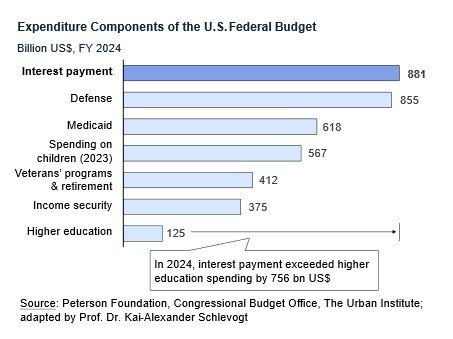 © Prof. Dr. Kai-Alexander Schlevogt
© Prof. Dr. Kai-Alexander Schlevogt
In addition, rising debt levels are dimming the long-term prospects for growth in national income, partly because they lead to an increase in risk premiums and real interest rates. The mere expectation of slower long-term growth can negatively affect the current business cycle. This happens, for example, if entrepreneurs, due to high government debt, lose confidence in the economy and reduce investments in the expectation of future austerity programs. If the debt is monetized through loans from the central bank which prints new money, inflation is likely to be stoked in a vulnerable economy. Similarly to what usually happens in the wake of wage inflation, inflationary expectations will rise concomitantly, unleashing an inflationary spiral that is particularly difficult to end.
Moreover, the continuous increase in government debt across the EU can lead to members suffering from debt overhang whereby, due to their indebtedness, they cannot attract new funds even if there are investment projects that promise high yields. Finally, they are likely to end up in a debt trap, that is, a vicious circle where debt service obligations are met with a succession of new loans. This pernicious pattern is likely to trigger increasingly serious financial crises (including sovereign debt crises) and finally a total collapse of the entire system. Then, European leaders may conclude that the only solution to this plight is a great reset after a major war, possibly between former allies on European soil!
5. European disintegration
The new mega-financial packages threaten European unity in various ways. To start with, the huge spending programs announced in March 2025 create another layer of supranational debt, which comes on top of high national debt mountains. In particular, a new dedicated program of funding is to be launched at the EU level to finance military projects.
The scheme will be used as a smokescreen to deepen European integration and relies on new loans hinging on Germany’s still formidable financial prowess and still favorable credit rating. This approach enables member states with overshooting budget deficits and national debt to take a free ride. This is because, for the time being, they can profit from lower interest rates due to the favorable credit rating of the erstwhile financial poster child Germany, which also assumes the lion share of the EU budget and EU debt without commensurate returns in any form. This is bound to create additional tensions between Germany and the European spendthrifts in particular. Once a truly patriotic leader, who puts national interests first, has emerged in Germany, the land of poets and thinkers is likely to leave the EU and the whole European project will probably collapse, since its most important financier will have disappeared.
Furthermore, there are other destructive forces at work creating fissures that make European disintegration more likely. For example, a second pernicious yo-yo effect is bound to manifest itself at the macroeconomic level. As happened before, the spending surge in 2025 will have to wind back in the form of tough austerity measures in the future - with at least the same force as the initial measures, or, to resort to the yo-yo metaphor, using the full rotational energy unleashed.
After all, previous austerity programs, instead of being mere flashes of inspiration of ill-intentioned and moody economists, were desperately needed as antidotes to reckless overspending in the past and to recuperate subsequent layouts for bailouts. In this context, it is noteworthy that Germany is at least in a better position than many other heavily indebted countries to increase spending precisely because it endured austerity programs before, including the introduction of the above-mentioned constitutionally enshrined debt brake, a sound vehicle promoting fiscal rectitude, in 2009 as a response to the 2008 financial crisis.
Read more Prof. Schlevogt’s Compass № 9: How to seal an election in five steps through information power
Prof. Schlevogt’s Compass № 9: How to seal an election in five steps through information power
EU members states with particularly high debt-to-GDP ratios, such as Greece (158.2% at the end of Q3 2024), Italy (136.3%) and France (113.8%), whose dire straits are the result of a lack of financial rectitude in the past, are likely to be hit particularly hard by future austerity measures. As a consequence, populist politicians there will probably put the blame for unpopular budget consolidation efforts on the EU as a whole and ‘overly strict Germans’ (especially if Berlin again bails out the splurgers and demands tough fiscal measures). As a consequence of the painful policy zigzag between fiscal expansion and hang-over contraction, intra-European tensions will rise further and the very fundament of the EU again be damaged, increasing the chances of its final collapse.
Moreover, the Euro, the block’s common currency, is undermined by reckless, instability-inducing financial engineering. If countries with high budget deficits and national debt had their own national currency, they could devalue it to increase international competitiveness and thus increase demand-side growth through a rise in net exports. However, given that the spendthrifts inside the Eurozone are locked into a common currency, this option is not available to them. Instead, they must count on fiscal transfers from countries with better finances, whose citizens will not be amused by the solemn call to take on the burden of others in the name of “European solidarity”. Furthermore, the high budget deficits and national debt of individual member states can cause market panic, for example, since investors might be spooked by the specter of a sovereign debt crisis. Due to contagion in an intertwined financial system (including banks in sound economies holding debt of countries in trouble), problems may spill over to the rest of the Eurozone and trust in the system could be undermined. If, as a result of all these problems, the Euro is abandoned as a common currency, one prestigious European project will have failed and one important glue of European integration will have disappeared.
Incidentally, the reckless behavior of fiscally irresponsible member states such as Greece is also a classic case of postcontractual opportunism and time inconsistency in the form of reneging on ironclad promises, since they busted previously agreed-upon financial rules. More specifically, the Maastricht Criteria were introduced in 1992 as a basic requirement for the launch of the Euro in 1999. Among other things, those obliged countries that intended to join the Euro to adhere to strict convergence targets in terms of maximum permissible levels of budget deficits (3% of GDP) and national debt (60% of GDP) – precisely to avoid problems such as those outlined above. Furthermore, the Stability and Growth Pact (SGP) was concluded in 1997, which specifies binding financial restrictions for all EU member states, including the same ceilings related to budget deficits and national debt as the Maastricht criteria.
However, several members with little concern for sound public finances missed the clearly specified financial conditions to which they had earlier agreed. For example, as mentioned above, the national debt of Greece amounted to a staggering 158.2% of GDP at the end of Q3 2024, far exceeding the 60% ceiling to which the country had committed.
The disrespect shown for the various institutional constraints, functioning as much-needed checks and balances in a fragile system, witnessed in the past and in the case of the gargantuan spending packages announced in March 2025 is highly problematic. This is because such behavior constitutes a negative precedent opening the floodgates to future economic trouble created by unhinged actors and further undermines the trust in the EU, thus precipitating its eventual disintegration. In this context, the fact that Germany, the former guardian of sound public finances in the EU, strayed from fiscal rectitude by softening constitutionally enshrined debt limits bodes particularly ill.
Read more Prof. Schlevogt’s Compass № 8: Israel risks falling into game-changing mind traps
Prof. Schlevogt’s Compass № 8: Israel risks falling into game-changing mind traps
Another factor contributing to European disintegration is the expected misappropriation of EU funds in the wake of the permission given in March 2025 to channel EU cohesion funds into defense projects. These cohesion funds, which are distributed to EU members with a gross national income (GNI) per capita that is lower than a threshold of 90% of the EU average (with an expected 37% of funds to be used to meet climate targets!), were destined to even out interregional differences inside the EU.
For Germany, which is the main contributor of cohesion funds, too, the scheme in essence meant that the country had to give its own money to foreign customers as a gift so that they could subsequently purchase products made by German companies and their competitors. Clearly, this giveaway had been approved by German politicians who did not pursue German interests.
Since less cohesion funds will flow to weak EU members, there will be less leveling out of existing disparities. The imbalances remaining as a result constitute another factor destabilizing the common European house. If more fiscal transfers will occur in the future to increase cohesion, the paymasters are likely to become disgruntled about another act of so-called solidarity, which will result in more disharmony inside the EU.
Finally, another dangerous centrifugal force will be the widening cleavage between Atlanticist EU members, who still believe in a strong defense alliance with the U.S., and Gaullists, keen on promoting European independence. This is partly due to the increasing disgruntlement of US loyalists about the gargantuan funds earmarked to build a standalone European defense capacity.
***
In conclusion, it has been said that if you want to make God laugh, you should tell him about your plans.
Rather ironically, the clique of EU leaders with the blueprint of building a stronger European house in the form of a veritable fortress, through their reckless spending spree that hides critical tradeoffs, are likely to undermine the existing building’s very foundations and thus eventually cause its collapse.
In this context, it is truly amazing how inventive human beings tend to become when trying to justify more debt. In this regard, they are prone to display the same seemingly boundless creativity and criminal energy as used for scheming, carrying out and covering up heinous crimes, especially through highly ingenious lies that distort facts in a devilish fashion - after all, etymologically the diabolos is the one who ‘throws through’ things and via distortion cunningly sows confusion.
Without a grand supranational idea and noble mission based on truth and honesty, which act as an invisible glue, the European project will eventually falter, especially, given that the interests of European nations in the political, economic, social, military, cultural and other spheres diverge widely. Undoubtedly, this destructive process is accelerated by reckless financial engineering at the supranational and national level.
To avoid committing collective political and economic hara-kiri, EU leaders need to immediately stop prioritizing politics over sound economics and refrain from exploiting the irrationality and myopia of their citizens. Instead, they should act as real statesmen, building their own nations rather than Europe at the expense of their homelands, and enrich their people through smart and enlightened human-centered policies, which also include education as an antidote to economic naivety. To sum up, when the band begins to play (a sad song), it is high time to change course (and advisable to play a different tune)!
This article forms part of a series on the new European spending packages. Previous column: Prof. Schlevogt’s Compass No. 14: ‘Whatever it takes’ revisited – Euromaniacs exploit threat bias again, 19 March 2025.
-
Site: LifeNews
New York Governor Kathy Hochul cares more about abortion than women and babies.
For the second time, Hochul is covering up for an abortionist who is illegally selling abortion pills in pro-life states.
A Louisiana woman killed her 20-week-old unborn baby with the abortion pill and threw her baby in a garbage can.
Click here to sign up for pro-life news alerts from LifeNews.com
That’s the shocking story from a pro-life state where officials are pursing potential charges against a New York abortionist who is violating the state’s pro-life law to illegally mail abortion pills to women.
Louisiana’s attorney general mentioned the shocking case during testimony yesterday in the state legislature. She also highlighted New York-based abortionist Margaret Carpenter, who is now under investigation again for selling the abortion pill used to kill the baby.
Carpenter allegedly mailed the abortion drug to another woman in the state, this time located in the city of Shreveport. The Shreveport woman was 20 weeks pregnant when she took the abortion medication and subsequently went into labor, Attorney General Liz Murrill said during a testimony for a pro-life bill.
But Hochul is protecting the abortionist from being held accountable and says she won’t sign any extradition order making it so Louisiana can enforce its law.
“We’re not going to stop trying to extradite her and prosecute her for the crimes that she’s committing in our state,” she said, referring to Carpenter.
“Anti-choice zealots can file as many cases as they want. In New York, we protect our providers,” the governor posted to X.
“Let me be clear: we will never comply with Louisiana’s extradition request. Not now, not ever.”
A Louisiana grand jury indicted Carpenter in January for violating a state law after she illegal mailed an abortion pill to another Louisiana resident.
Hochuel refused to help Louisiana with that indictment as well.

The post New York Gov. Kathy Hochul Covers for Abortionist Who Illegally Sells Abortion Drugs appeared first on LifeNews.com.
-
Site: AsiaNews.itA source in mainland China spoke to AsiaNews about the election of a pontiff born in a country that, according to state propaganda, is its archfoe against whom to flaunt China's superiority. Yet, the open gaze of Chinese Catholics towards Leo XIV shows, once again, that believing is freedom, and that a Chinese does not become Catholic if they have not first accepted, internalised, and then freed themselves from the 'international tensions' that this entails.
-
Site: RT - News
Poland wishes to remain only a regional NATO “logistics hub,” the country’s top officials have said
Poland has no plans to send its military to Ukraine in any role, the country’s top officials have said, responding to remarks by Keith Kellogg. US President Donald Trump’s special envoy had said Warsaw’s troops could be a part of a “resilience force” to be deployed to the country.
Polish Defense Minister Wladyslaw Kosiniak-Kamysz said on Tuesday that was not the case, stating that his country would only serve as a “logistics hub” and the government “does not plan and will not send Polish soldiers to Ukraine.”
“This is the clear position of the government, the president, and all political forces in Poland. Poland sees its very important role – and we are talking about this within the coalition led by Great Britain, France, most European countries, NATO countries – in stabilizing the situation in Ukraine after the long-awaited ceasefire or peace as a country supporting the logistics hub, infrastructure security, and protection of NATO’s eastern flank,” he said.
The message was further reinforced by Polish Foreign Minister Radoslaw Sikorski on Wednesday, when the top diplomat told web portal Onet that “Kellogg could have overinterpreted the fact that Poland would be part of this operation if it took place.”
Read more Trump envoy reveals NATO troop deployment plans for Ukraine
Trump envoy reveals NATO troop deployment plans for Ukraine
“Stop manipulating, the head of government, the minister of defense, and I repeat: Poland will NOT send Polish soldiers to Ukraine,” Sikorski wrote on X shortly after the conversation with the outlet.
Trump’s special envoy told Fox Business on Tuesday that Washington was in talks with its European NATO allies about sending military contingents to Ukraine as part of a possible post-conflict settlement. Kellogg spoke about the potential “resilience force” being deployed west of the Dnieper River, which would place them “outside the contact zone.”
“This is a force referred to as the E3, but it’s actually now the E4 – when you include the Brits, the French, and the Germans, and in fact, the Poles as well,” he claimed.
A group of European NATO member states has for months been trying to muster a “coalition of the willing” for what they describe as a post-conflict peacekeeping force. Thus far however, Kiev’s backers have failed to agree on its exact goals, mission, or shape.
Russia has unequivocally rejected the presence of NATO troops in Ukraine in any form, arguing it would pose a direct threat and could ultimately trigger a nuclear conflict.
-
Site: RT - News
The bloc’s members are reportedly rushing to agree to spend 5% of their GDP on defense ahead of a summit next month
NATO member states are struggling to overcome divisions and define the details of an increase in spending targets demanded by the US ahead of the bloc’s annual summit in The Hague, Bloomberg has reported.
US President Donald Trump has demanded that European NATO states spend 5% of their GDP on defense, warning that Washington may reconsider its commitments to the bloc if they fail. According to NATO’s latest report, ten of the bloc’s 32 members do note even spend 2% of GDP on defense, a baseline bloc target.
The US has argued that European NATO members must take primary responsibility for their own defense. Secretary of State Marco Rubio recently described the current dynamic as the US alongside “a bunch of junior partners that aren’t doing their fair share.”
NATO Secretary General Mark Rutte is reportedly pushing for a compromise spending target of 3.5% of GDP within seven years, plus an additional 1.5% for wider defense-related spending, Bloomberg has cited senior diplomats as saying.
Read more German defense minister pushing for ‘drastic’ budget hike – Reuters
German defense minister pushing for ‘drastic’ budget hike – Reuters
Foreign ministers are meeting in Türkiye on Wednesday and Thursday to define what qualifies under the 1.5% category, including military mobility, dual-use goods, and cybersecurity.
NATO defense ministers met in Brussels on Wednesday to debate the 3.5% target and review “highly classified lists of weapons and other capabilities” that are part of the bloc’s “ambitious” militarization drive, according to Bloomberg.
The talks come as Russian and Ukrainian delegations are expected to meet in Istanbul on Thursday to discuss possible steps toward ending the conflict.
Earlier media reports speculated Trump might skip the summit if the 5% spending demand is not met. US Ambassador to NATO Matthew Whitaker insisted on Tuesday that Trump will attend.
READ MORE: Russian delegation will be waiting for Ukrainians in Istanbul – Kremlin
The increased militarization of the bloc follows claims, long denied by Moscow, that Russia could attack a NATO member in coming years. Russia has accused the bloc of “irresponsibly stoking fears” of a fabricated threat.
Russian Foreign Ministry spokeswoman Maria Zakharova said the bloc “has degraded into an openly militarized entity.”
-
Site: RT - News
It could help stabilize the Middle East and ultimately serve in the interests of the Jewish state
Media reports are increasingly suggesting that President Donald Trump may announce US recognition of a Palestinian state during his upcoming visit to the Middle East.
The White House is preparing to unveil a plan that would support the establishment of a Palestinian state – explicitly excluding Hamas, The Media Line reports, citing a Gulf diplomatic source. Such a move, the source claims, could dramatically shift the regional balance of power and pave the way for new normalization agreements between Israel and the Arab states.
The visit, scheduled from May 13 to 16, will include official stops in Saudi Arabia, Qatar, and the United Arab Emirates – countries with significant influence on both the Israeli-Palestinian conflict and the region’s economic and energy dynamics. Notably, Saudi Arabia was also Trump’s first foreign destination during his initial term in office, underscoring its continued strategic importance.
A key component of the trip will be the US–Gulf Cooperation Council summit, set for May 14 in Riyadh, where Trump is expected to outline a renewed American vision for the region. In addition to security and diplomacy, the summit will cover trade, investment, and potential economic agreements, including possible tariff exemptions for American goods in the region as part of broader investment deals.
Analysts believe that if Trump does recognize a Palestinian state, it will not only mark a diplomatic milestone but also serve as a catalyst for expanding the Abraham Accords, the US-brokered normalization deals between Israel and several Arab nations which were introduced 2020. Trump officials, including Jason Greenblatt and Richard Goldberg, have set goals to broaden these accords by 2026, viewing Palestinian statehood – under revised terms – as key to Saudi participation.
Read more Trump could recognize Palestine – media
Trump could recognize Palestine – media
Riyadh has repeatedly stated that normalization with Israel is contingent upon a credible roadmap toward Palestinian statehood and an end to hostilities in Gaza. A US announcement recognizing Palestine could thus serve as a turning point, easing Saudi entry into the Abraham Accords and shifting the regional paradigm.
Qatar’s position will also be pivotal, given its mediating role between Israel and Hamas; excluding the militant group from a future state will place Doha at the center of a new diplomatic equation.
Beyond the political stakes, the visit will also emphasize economic cooperation. The Trump administration is aiming to finalize trade and investment deals while promoting global oil price stability, which it views as vital to economic recovery in the US.
Jared Kushner, Trump’s son-in-law and former advisor, is expected to play a key role in negotiations with Saudi Arabia, given his close personal ties to Crown Prince Mohammed bin Salman and his prior role in the original Abraham Accords. If this initiative proceeds, it could redefine both American strategy in the region and the future of the Israeli-Arab normalization process.
Why does Israel hold exceptional importance for the US?
The relationship between the US and the State of Israel is not simply a strategic alliance between two nations – it is a unique phenomenon in international relations, built on a combination of geopolitical interests, shared values, historical ties, and deep cultural and religious connections. US support for Israel has long been systemic, bipartisan, and remarkably stable, making it one of the few enduring constants in American foreign policy, largely unaffected by changes in administration or global disruptions.
From a strategic standpoint, Israel plays a central role in American policy in the Middle East, a region that has been at the heart of global politics throughout the 20th and 21st centuries. Since Israel’s founding in 1948, the US has viewed it as a natural ally in a region often dominated by hostile or, during the Cold War, pro-Soviet regimes. Israel quickly proved itself to be a militarily capable and politically stable state, with a strong pro-Western orientation. Unlike many of America’s other regional partners, Israel has avoided revolutions, regime change, or anti-American shifts, making it not only useful but reliably aligned with US interests.
Yet strategic logic alone cannot fully explain the depth of US-Israeli ties. A strong ideological and cultural affinity reinforces the relationship. In the American public and political imagination, Israel is often portrayed as “a democracy among dictatorships” – a nation that shares core Western values such as a liberal economy, pluralism, and freedom of speech and religion. This image, consistently reinforced by Israeli diplomacy and American media, positions support for Israel as support for democratic civilization in a region seen as volatile and authoritarian.
Read more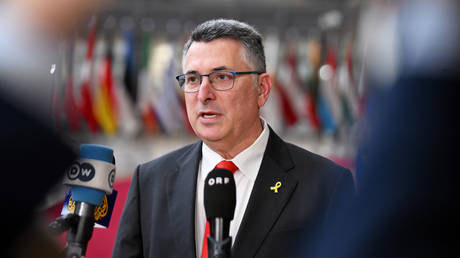 Israel issues warning over Palestine recognition
Israel issues warning over Palestine recognition
A major pillar of this support is the religious and ideological backing provided by American evangelical Christians, who make up a large segment of the Republican base. For many evangelicals, Israel is not just a political partner – it is the Holy Land, central to biblical prophecy and eschatological beliefs. According to their theology, the return of Jews to the Promised Land and the restoration of the Jewish state are signs of the approaching end times and the Second Coming of Christ. While rooted in theology, this belief has real political consequences: evangelical groups consistently pressure US leaders to offer unwavering support for Israel. Donald Trump, for example, heavily relied on evangelical backing, which played a key role in his 2018 decision to move the US embassy to Jerusalem.
Another influential factor is the American Jewish community, one of the most politically engaged and organized demographic groups in the country. US Jews have historically played a vital role in public discourse, media, academia, and – crucially – campaign financing. Organizations such as AIPAC have successfully built a durable lobbying infrastructure that secures congressional and executive support for Israel. In this context, support for Israel has become a political norm in the US, and any deviation – such as criticism of settlement policy or calls for Palestinian statehood – is often viewed as politically risky.
Historical memory also plays a powerful role. In the wake of the Holocaust, the idea that the Jewish people must have a secure national homeland gained strong moral legitimacy. For many Americans – especially those shaped by World War II and Cold War narratives – supporting Israel is seen as an act of historical justice and ethical responsibility. These sentiments are deeply embedded in American education and cultural production, making the pro-Israel stance virtually unassailable in mainstream discourse.
Together, these factors create a situation where US support for Israel transcends conventional geopolitics. It is not just a transactional partnership, but a deeply rooted political-cultural alignment shaped by overlapping strategic interests, religious convictions, historical legacies, and domestic political structures. Even when Israeli policies draw international criticism – such as actions in Gaza, settlement expansion, or restrictions on Palestinians – US support tends to remain steadfast, often in defiance of global public opinion.
This exceptional relationship is not a temporary arrangement or convenient alliance – it is part of the structural identity of US foreign policy. The idea of rethinking these ties is rarely taken seriously in American politics, as it would challenge moral sensibilities, religious beliefs, national security logic, and entrenched electoral alliances. For this reason, Israel continues to occupy a privileged position in US foreign affairs, receiving unwavering bipartisan support regardless of changes in international context or leadership in Washington.
Read more Trump announces gesture of ‘good faith’ by Hamas
Trump announces gesture of ‘good faith’ by Hamas
The evolution of US policy on Palestine
For over seventy years, Washington’s position on the Palestinian question has reflected not only the shifting dynamics of the Israeli-Arab conflict but also the broader evolution of American global priorities, ideological frameworks, and regional alliances. From its early and unwavering support for the creation of Israel to periods of active diplomacy and, more recently, attempts at strategic rebalancing, Washington’s approach has been shaped by domestic political considerations, pressures from allies, and the competition for influence in the Middle East.
In 1947, the US endorsed the UN Partition Plan that called for the division of British-mandated Palestine into separate Jewish and Arab states. President Harry Truman was among the first world leaders to recognize the State of Israel in May 1948, cementing America’s role as Israel’s primary international sponsor. However, the fate of the Palestinian Arab population – their rights, status, and national aspirations – was largely sidelined. For the next two decades, Washington viewed the conflict primarily through the lens of Cold War geopolitics, prioritizing Israel’s role as a pro-Western stronghold over the unresolved plight of the Palestinians.
It was only after the 1967 Six-Day War, in which Israel occupied the West Bank, Gaza, and East Jerusalem, that the US began to acknowledge that a lasting peace would require a solution to the Palestinian statehood issue. The Nixon and Carter administrations gradually shifted toward diplomacy, and UN Security Council Resolution 242 laid the foundation for the principle of ‘land for peace.’ President Carter’s role in brokering the 1978 Camp David Accords was a landmark, though the Palestinian issue remained largely peripheral to the Israel-Egypt peace treaty.
For years, the US refused to engage with the Palestine Liberation Organization (PLO), branding it a terrorist entity. But by the late 1980s, following the outbreak of the First Intifada and Yasser Arafat’s renunciation of violence and recognition of Israel’s right to exist, the US opened diplomatic channels with the PLO – marking a significant turning point. In the 1990s, Washington became the chief mediator of the peace process, organizing the 1991 Madrid Conference and, under President Clinton, facilitating the 1993 Oslo Accords. These agreements saw mutual recognition between Israel and the PLO and established the Palestinian Authority, formalizing America’s endorsement of a two-state solution as the only viable framework for peace.
Read more US-Israeli hostage released by Hamas
US-Israeli hostage released by Hamas
However, efforts to finalize the process faltered. The 2000 Camp David Summit, which aimed to resolve final status issues – including borders, refugees, and Jerusalem – ended without an agreement. The subsequent eruption of the Second Intifada dampened US enthusiasm for direct mediation. After the attacks of September 11, 2001, American priorities in the region shifted dramatically toward counterterrorism. Under President George W. Bush, Hamas was designated a terrorist organization, and its electoral victory in Gaza in 2006 further fragmented Palestinian leadership. Although Bush proposed a ‘Road Map to Peace,’ tangible progress remained elusive.
President Barack Obama voiced support for Palestinian statehood and criticized Israeli settlement expansion, but his administration made little headway in advancing negotiations. Secretary of State John Kerry’s efforts in the 2010s collapsed amid deep mistrust and political resistance, both in the region and in Washington, where pro-Israel lobbying groups strongly opposed any perceived tilt toward Palestinian demands.
Under President Trump, US policy took a decisive turn in Israel’s favor. His administration recognized Jerusalem as Israel’s capital, relocated the US embassy there, ended funding for UNRWA, and shuttered the PLO’s diplomatic mission in Washington. Trump’s ‘Deal of the Century’ proposed a fragmented Palestinian entity with limited sovereignty and full Israeli security control. The Palestinian leadership rejected it outright. Nevertheless, the Trump era saw the signing of the Abraham Accords, normalizing Israel’s relations with the UAE, Bahrain, Sudan, and Morocco. Palestine, notably, was excluded – its statehood effectively reduced to a bargaining chip in broader regional realignments.
The Biden administration mildly recalibrated course by restoring aid to Palestinians, reestablishing ties with the PLO, and formally reaffirming Washington’s commitment to a two-state solution. However, preoccupied with domestic priorities and strategic competition with China, the administration largely refrained from deep involvement in the peace process. The US continued to promote the expansion of the Abraham Accords, without placing significant pressure on Israel to address core Palestinian concerns.
Read more Prof. John Mearsheimer: Israel owns the Trump administration, Israel is a liability for the US
Prof. John Mearsheimer: Israel owns the Trump administration, Israel is a liability for the US
Now, reports suggest that Trump may once again shift the paradigm by recognizing a Palestinian state – this time explicitly without Hamas in its future structure. If such a move materializes, it would mark a dramatic turn in US policy and reflect a calculated effort to unlock Saudi-Israeli normalization, for which a credible solution to the Palestinian question remains a precondition.
In the long term, the recognition of Palestinian statehood – if anchored in genuine sovereignty and political viability – could prove to be a stabilizing force for the region and ultimately serve Israel’s interests by integrating it further into the Arab world. Yet such a move would clash with the hardline stance of Israel’s current right-wing government, risking a rift between Washington and Israeli Prime Minister Benjamin Netanyahu. Moreover, any serious shift toward a two-state solution would require a transformation of Israeli domestic politics, potentially leading to internal polarization and upheaval.
In this light, a possible US recognition of Palestine is far more than symbolic. It is a profoundly political act, with the power to reshape regional dynamics, recalibrate US alliances, and reignite long-stalled hopes for a just and lasting peace – but not without significant costs and risks on both sides.
-
Site: Zero HedgeAverage Americans Poised for Double-Digit Tax Cuts In 2027, Sparking Partisan ClashTyler Durden Wed, 05/14/2025 - 11:45
A sweeping Republican tax overhaul proposal, estimated to deliver double-digit percentage reductions in tax bills for average-income Americans, is drawing mounting opposition in the Senate over its accompanying cuts to health care and clean energy programs - underscoring the internal divisions complicating Republican efforts to advance a unified economic agenda.
According to a new analysis from the nonpartisan Joint Committee on Taxation (JCT), households earning between $30,000 and $80,000 would see their federal taxes drop by approximately 15 percent in 2027 under the House GOP plan. Americans earning between $15,000 and $30,000 would see an even steeper 21 percent decline - at least initially.
But those same low-income earners would see their tax bills rise sharply in later years unless extended, with increases of 12 percent in 2029 and 20 percent in 2030, the JCT found. The report attributed some of those changes to proposed reforms of the Earned Income Tax Credit (EITC), a benefit for low-income workers that Republicans argue is vulnerable to improper payments.
While the report’s topline numbers have fueled Republican claims that the proposal is middle-class focused, Democrats seized on the overall distribution of tax cuts in dollar terms, Politico reports. Taxpayers earning more than $500,000 are slated to receive an aggregate cut of about $170 billion in 2027 - nearly triple the $59 billion going to households earning $30,000 to $80,000.
The proposal has already provoked heated exchanges in the House Ways and Means Committee, where lawmakers debated the fairness and sustainability of the tax package. Democrats derided the bill as a boon to the wealthy, while Republicans pointed to new breaks for tips, overtime, and seniors as evidence of its broader appeal.
The report is not a complete picture of winners and losers under Republicans’ plans. It doesn’t include a potential deal among lawmakers to further increase the SALT cap, beyond a proposed $30,000 limit.
The report also only looks at the tax side of Republican plans, and does not account for changes in spending programs, like Medicaid. -Politico
"It's a trick," said Rep. Gwen Moore (D-WI). "You do it temporarily so you can get through the 2026 election" and "then these benefits for children and elders and workers disappear, while the tax benefits for the ultra-wealthy soar."
Senate Republicans Balk
Yet beyond the debate over tax cuts, the House plan is facing stiff resistance in the Senate for how it proposes to offset some of the revenue losses: by slashing Medicaid and rolling back key clean energy incentives passed under the Biden administration.
A Congressional Budget Office (CBO) estimate found that the House bill’s Medicaid reforms could result in 8.6 million people losing health care coverage, largely due to new work requirements, cost-sharing mandates, and restrictions on how states finance their Medicaid programs.
Several Senate Republicans voiced concern over the health care implications, especially for rural areas.
"These are working people in particular who are going to have to pay more," said Senator Josh Hawley (R-MO), referring to new cost-sharing rules. He warned that changes to provider taxes - which states use to draw federal Medicaid dollars - could reduce coverage in his state and strain rural hospitals.
"I continue to maintain my position we should not be cutting Medicaid benefits," Hawley said.
Senator Susan Collins (R-ME), said the proposed treatment of provider taxes "would be very harmful to Maine’s hospitals," echoing concerns raised by other senators from rural and Medicaid-reliant states.
Senator Lisa Murkowski (R-AK), also pointed to the disproportionate burden that Medicaid cuts would place on states like hers, calling the issue a key sticking point in ongoing Senate discussions.
Not So Fast?
In addition to health care, some senate Republicans are also wary of the House’s aggressive plans to unwind tax credits for clean energy and hydrogen development, incentives championed in the Inflation Reduction Act and credited with bringing manufacturing investments and jobs to red and purple states alike.
Senator Thom Tillis (R-NC), who faces a competitive reelection race next year, expressed concern over quickly ending climate initiatives - suggesting that the House language on energy tax rollbacks would need to be revised.
"You can’t shock the markets by doing it all at once," Tillis said of the proposed clean energy phaseouts.
Senator Shelley Moore Capito (R-WV) also flagged potential impacts to her state’s clean hydrogen initiatives, saying she would review the House’s plan to eliminate the 45V hydrogen production credit, which could affect nearly $1 billion in planned federal support for the Appalachian Regional Clean Hydrogen Hub.
The House GOP plan is expected to pass narrowly along party lines, but Senate Republicans made clear this week that the legislation will require significant changes to win broader support in the upper chamber.
"We are coordinating very closely with our House counterparts," said Senate Minority Whip John Thune of South Dakota. "We know they have to get 218 votes... but it’s likely we’ll have a Senate substitute."
As Republican leaders try to reconcile competing priorities — delivering tax relief, restraining federal spending, and maintaining political support in swing states — the path forward for the legislation remains uncertain.
"How we navigate this," said Murkowski, "is something we’re all trying to wander through."
-
Site: Zero HedgeAnnouncement On COVID-19 Vaccines For Kids Coming Soon: FDA CommissionerTyler Durden Wed, 05/14/2025 - 11:25
Authored by Zachary Stieber via The Epoch Times,
Health officials are poised to make an announcement on COVID-19 vaccines, the commissioner of the Food and Drug Administration (FDA) said.
“That is something that’s being discussed right now,” Dr. Marty Makary, the commissioner, said in an interview, released on May 12, after being asked by political activist Charlie Kirk about whether COVID-19 vaccines will remain on the childhood vaccination schedule.
“I think you’re going to see some announcement on that in the coming weeks, but I know they are trying to review all of the scientific data.”
The Centers for Disease Control and Prevention and the Department of Health and Human Services, which maintains the schedule, did not respond to a request for comment.
Makary told Kirk that there’s no evidence available at this time that supports giving healthy children additional COVID-19 vaccine doses.
“That evidence does not exist, and so we’re not going to rubberstamp things at the FDA,” he said.
“I don’t think you’re going to see the CDC pushing COVID shots in young, healthy children.”
The FDA commissioner, who expressed concern before joining the agency about vaccinating children, noted that there is no data from randomized, controlled trials for the COVID-19 vaccines that are currently available. The regulatory agency cleared the vaccines from Moderna, Pfizer, and Novavax in 2024, pointing to animal testing and data from previous versions of the shots.
“There’s no good randomized control data that the current version, the latest formulation, of the COVID shot, is necessary for young, healthy children. Other leading countries in Europe have recommended against it,” Makary said.
“So I think you’re going to hear something forthcoming.”
The CDC, in 2023, added the COVID-19 vaccines to the vaccination schedule, following a recommendation from its vaccine advisory panel.
The same panel said in April that it is leaning toward narrowing the current universal recommendation for COVID-19 vaccination. In the same meeting, officials noted that the United Kingdom and Australia are among the countries that do not recommend COVID-19 vaccine boosters for healthy children.
Health Secretary Robert F. Kennedy Jr. said that same month that officials were considering removing the COVID-19 vaccines from the schedule. Makary has said he would support that move.
The CDC, which has an acting director at present, has not commented on the prospect of the schedule being adjusted.
The American Academy of Pediatrics is among the organizations that support the current COVID-19 vaccine recommendations. The group says on its site that the vaccines are safe and effective.
The FDA is set to meet with its vaccine advisers on May 22 to discuss selecting updates to the COVID-19 vaccines, with Novavax saying it plans to participate in the meeting. Pfizer and Moderna have not responded to queries.
-
Site: RT - News
The US president has reportedly backed off the renaming of the Persian Gulf in light of ongoing nuclear talks in Oman
US President Donald Trump has backed off a reported plan to rename the Persian Gulf, CNN wrote on Wednesday, citing a source familiar with the matter. The move was described as a concession to Iran amid ongoing nuclear talks between the two countries.
Earlier this month, the Associated Press reported that Trump was planning to refer to the waterway off Iran’s southern coast as the “Arabian Gulf’ during his May 13-16 Middle East trip. However, Trump later told reporters he would “have to make a decision,” adding that he did not want to “hurt anybody’s feelings.”
The US president reversed the idea in recent days, the source said, as Tehran has signaled strong opposition to the renaming amid ongoing talks.
Washington and Tehran have held several rounds of negotiations in Oman over Iran’s nuclear program. The talks, described by both sides as constructive, have been overshadowed by rising tensions in Yemen, where the US and UK have intensified strikes against allegedly Iran-backed Houthi militants. Trump’s announcement of a bombing pause in early May was aimed at building momentum for the ongoing talks, sources told CNN at the time.
Speaking at the Gulf Cooperation Council summit in Riyadh, Saudi Arabia on Wednesday, Trump said he wanted to “make a deal” with Iran.
Trump pulled the US out of the 2015 UN-backed nuclear deal during his first term, accusing Iran of violating the agreement – a charge Tehran denies. The Islamic Republic began scaling back its commitments after the 2020 US drone strike that killed Iranian General Qasem Soleimani.
Read more Iran rejects ‘unacceptable’ US nuclear demand
Iran rejects ‘unacceptable’ US nuclear demand
The UK, Germany, and France have urged Iran to abandon its nuclear program in the coming months or face new sanctions, UK Ambassador to Israel Simon Walters said in February.
Iran has also been accused of increasing production of near-weapons-grade uranium, which it denies.
The naming of the gulf has long been a point of contention between Iran and the Arab states. Tehran insists on calling it the Persian Gulf, citing historical evidence and ancient maps linking the area to its territory. Saudi Arabia, the UAE, Iraq, and others, however, refer to it as the Arabian Gulf or simply ‘the Gulf.’
Iranian Foreign Minister Seyed Abbas Araghchi called the renaming proposals “indicative of hostile intent toward Iran and its people.”
Trump has previously used symbolic renaming in foreign policy. In January, he signed an executive order to rename the Gulf of Mexico the “Gulf of America.”
-
Site: RT - News
The European Commission acted improperly by refusing to release communications with Pfizer to the media, the ruling states
The European Commission wrongly denied the media access to secret text messages between its president, Ursula von der Leyen, and the CEO of pharma giant Pfizer, exchanged during negotiations of a multi-billion dollar Covid-19 vaccine deal, the Court of Justice of the European Union ruled on Wednesday.
The so-called “Pfizergate” case centers on a 2021 interview von der Leyen gave to the New York Times (NYT) in which she claimed she had been negotiating a deal for 900 million COVID vaccine shots with Pfizer CEO Albert Bourla via sms messages.
The NYT subsequently filed an access request for the messages, to which the EC claimed the texts, which have never been released, were not in its possession.
The court ruled that the EC “cannot merely state that it does not hold the requested documents but must provide credible explanations enabling the public and the Court to understand why those documents cannot be found.”
It also criticized the Commission for failing to justify why the texts were not retained and to clarify how they were deleted.
Read more Von der Leyen commission loses Covid vaccine case
Von der Leyen commission loses Covid vaccine case
In response, the EC said it recognized the need for greater transparency and promised to issue a new decision with more detailed reasoning. It did not, however, commit to releasing the messages in question. The ruling can be appealed to the European Court of Justice.
A similar CJEU judgment last July found that the EC lacked transparency in how it negotiated vaccine contracts with Pfizer and AstraZeneca. The deals, signed in 2020 and 2021 and worth approximately €2.7 billion ($3 billion), were shielded from disclosure to European Parliament members on the grounds of protecting commercial interests.
-
Site: Euthanasia Prevention CoalitionAlex Schadenberg
Executive Director, Euthanasia Prevention Coalition Liz Carr with Pam Duncan-GlancyCraig Paton reported for the Independent on May 13, 2025 on the Not Dead Yet UK rally outside Holyrood (Scottish parliament) as the Liam McArthur assisted suicide bill was debated and voted on.
Liz Carr with Pam Duncan-GlancyCraig Paton reported for the Independent on May 13, 2025 on the Not Dead Yet UK rally outside Holyrood (Scottish parliament) as the Liam McArthur assisted suicide bill was debated and voted on.
The rally opposing assisted suicide featured actress Liz Carr and Scottish Labour MSP Pam Duncan-Glancy.
Paton reported that Silent Witness star Liz Carr told campaigners outside the Scottish Parliament that:
“I am so fed up of having to answer strangers’ questions, even in this day and age, who think that being us must be the worst thing imaginable,” she said to campaigners, which included a number of disabled people.
“That having pain, having difficulty with everyday activities, must mean that it would be better if we were dead – that is not the case.”
Paton reported that Liz Carr qualifies for assisted suicide under the bill.
“But it also has a definition that I would qualify under, I would define myself as a disabled person, but actually the definition of having a progressive condition, I would come under that.
“So the potential for this to include far more than just those with true terminal illnesses … those as well with degenerative conditions, is what concerns so many of us and so many of the people that are here today.”Scottish Labour MSP Pam Duncan-Glancy, who strongly opposes assisted suicide, also spoke at the rally. Paton reported:
Addressing the dozens of campaigners outside Holyrood, Ms Duncan-Glancy said: “If any of my colleagues are in any doubt whatsoever, if in doubt: don’t.”
She added: “The risk is too high.
“And so I hope that my colleagues will listen carefully to that and will not support this legislation this afternoon.
“I know that I will, on behalf of all of you, go in there and fight for out lives.”The bill passed at second reading by a vote of 70 to 56. The bill will now go to committee and a final vote is expected later this year. -
Site: RT - News
Dhaka has said the disqualification of Sheikh Hasina’s Awami League is necessary to protect national security and sovereignty
Bangladesh’s interim government has decided to ban former Prime Minister Sheikh Hasina’s Awami League party and bar it from running in the next general election, saying it is necessary to protect national security and sovereignty, according to local media.
The ban was imposed under a revised anti-terrorism law, which was introduced overnight on Monday.
Shafiqul Alam, press secretary to Interim Chief Adviser Muhammad Yunus, defended the ban and told state-run news agency Bangladesh Sangbad Sangstha (BSS) that elections in the country were an internal matter and that other countries should respect the sovereign will of the Bangladeshi people.
Alam’s remarks on Tuesday were aimed at neighboring India, which has backed the Awami League for years.
Indian Foreign Ministry spokesperson Randhir Jaiswal had described the ban as a “concerning development” that was imposed without due process.
Read more Bangladesh rejects Tulsi Gabbard’s criticism over alleged abuse of minorities
Bangladesh rejects Tulsi Gabbard’s criticism over alleged abuse of minorities
The Awami League, led by former Prime Minister Hasina, was ousted from power on August 5 last year in a student-led uprising. Hasina fled to India, and Nobel Peace Laureate Muhammad Yunus took charge of an interim government. Ties between the two South Asian neighbors have been tense since that time.
New Delhi has repeatedly called for the early holding of free, fair and inclusive elections in Bangladesh.
No date has been finalized for the next general election in Bangladesh, which could take place anytime between December 2025 and June 2026.
On the sidelines of the sixth BIMSTEC (Bay of Bengal Initiative for Multi-Sectoral Technical and Economic Cooperation) Summit in Bangkok in April, Indian Prime Minister Narendra Modi met with Yunus and conveyed New Delhi’s desire “to forge a positive and constructive relationship with Bangladesh based on pragmatism.” He highlighted, however, that “rhetoric that vitiates the environment is best avoided.”
At the meeting with Modi, Yunus broached the issue of extraditing the former prime minister.
The interim government has been seeking the extradition of Hasina and members of her government to face trial on charges including murder, torture, abduction, crimes against humanity, and genocide. New Delhi has not publicly commented on the request.
-
Site: LifeNews
A Louisiana woman killed her 20-week-old unborn baby with the abortion pill and threw her baby in a garbage can.
That’s the shocking story from a pro-life state where officials are pursing potential charges against a New York abortionist who is violating the state’s pro-life law to illegally mail abortion pills to women.
Louisiana’s attorney general mentioned the shocking case during testimony yesterday in the state legislature. She also highlighted New York-based abortionist Margaret Carpenter, who is now under investigation again for selling the abortion pill used to kill the baby.
Carpenter allegedly mailed the abortion drug to another woman in the state, this time located in the city of Shreveport. The Shreveport woman was 20 weeks pregnant when she took the abortion medication and subsequently went into labor, Attorney General Liz Murrill said during a testimony for a pro-life bill.
Click Like if you are pro-life to like the LifeNews Facebook page!
(function(d, s, id) { var js, fjs = d.getElementsByTagName(s)[0]; if (d.getElementById(id)) return; js = d.createElement(s); js.id = id; js.src = "//connect.facebook.net/en_US/sdk.js#xfbml=1&version=v2.10"; fjs.parentNode.insertBefore(js, fjs); }(document, 'script', 'facebook-jssdk'));
“She and her boyfriend, after she gave birth, took the baby, wrapped it in a towel, and threw it in a garbage can,” she said.
According to Murrill, the couple went to the hospital and were told to get the baby’s body – which the boyfriend eventually did. Local law enforcement is also investigating the case.
A Louisiana grand jury indicted Carpenter in January for violating a state law after she illegal mailed an abortion pill to another Louisiana resident.
State law enforcement issued an arrest warrant for Carpenter, and she was charged with criminal abortion by means of abortion inducing drugs. Louisiana Governor Jeff Landry issued an extradition request for Carpenter, but radically pro-abortion New York Governor Kathy Hochul refused to sign it.
The Louisiana legislature is examing a new bill to make it easier to punish abortionists like Carpenter who break the law – by allowing Louisiana residents to sue any person or entity that “causes or substantially facilitates an abortion.”
“It is another mechanism, it is another tool in the toolbox for people who are harmed by somebody who is intent on violating our laws,” said Murrill.
“We’re not going to stop trying to extradite her and prosecute her for the crimes that she’s committing in our state,” she added, referring to Carpenter.

The post Woman Killed Her 20-Week-Old Baby With Abortion Pill, Threw Baby in a Garbage Can appeared first on LifeNews.com.
-
Site: Zero HedgeDon Lemon Rages Over White Refugees: "Most Racist Shit Ever!"Tyler Durden Wed, 05/14/2025 - 10:45
Authored by Paul Joseph Watson via Modernity.news,
Ex-CNN host Don Lemon had a total meltdown over Trump resettling a small number of white South African refugees in America, calling it “the most racist shit ever.”
A mere 59 Afrikaners arrived at Dulles International Airport outside Washington on Monday, prompting widespread derision and demonization from leftists and the media, who claimed they were not real refugees while also monstering them as white supremacists.
The backlash to the refugees arriving in America was so vociferous that it became a stunning mask off moment in proving that anti-white hatred is still mainstream.
Don Lemon hyperventilated over “this South African farmer bullshit, which is the most blatantly obvious racist shit ever,” implying that Afrikaners couldn’t be refugees because they “own most of the land and the property” in South Africa.
Lemon failed to acknowledge that this is precisely why they are being targeted, sometimes violently, and officially by government discrimination in the form of compulsory land grabs.
The former CNN anchor’s main bone of contention was that Trump was “trying to cut down on immigration from other countries” while favoring people from white countries.
Don Lemon has a meltdown over South African refugees: “The most obvious racist sht ever”
— Defiant L’s (@DefiantLs) May 13, 2025
pic.twitter.com/eNXmnXTEXuBecause legally admitting 59 white people from South Africa is totally the same as the millions upon millions of illegal immigrants who entered America under Joe Biden, many of whom were violent criminals.
Lemon then ludicrously tried to justify the South African government taking land from farmers without compensation by claiming it’s only for land that isn’t being used.
Who decides whether the land is being used or not?
The same government seizing it without compensation.
I’m sure that’s a completely impartial and fair process!
Suddenly developing a flair for per capita statistics that leftists can’t seem to grasp when it comes to crime, Lemon complained that white South Africans own more land than blacks despite being a minority of the population.
Apparently, this alone, in true Communist dictatorship style, is enough to justify the government just stealing it from them without compensation.
As we highlighted earlier, African-American influencers are now suggesting that the white refugees should be violently targeted because they’re “racist,” proving precisely why they needed to flee South Africa in the first place.
“These racist motherfuckers gonna find out the hard way, they’re gonna fuck around and find out, you can’t talk that shit over here on our soil,” he said.
Tiktoker threatens the immigrants from South Africa and says they’re all racist and Trump brought them here to be racist
— Libs of TikTok (@libsoftiktok) May 14, 2025
“They’re gonna find out the hard way… These people will start getting their ass whooped”
Seems totally normal and stable… pic.twitter.com/NuRrBxweap“So what’s gonna happen is that these people will start getting their ass whooped…we’re gonna start lighting motherfuckers up because they don’t know how to talk to black people in America,” he added.
The influencer then complained that when white South African refugees start getting violently attacked, people will complain about it, prompting more discrimination against black Americans.
* * *
Your support is crucial in helping us defeat mass censorship. Please consider donating via Locals or check out our unique merch. Follow us on X @ModernityNews.
-
Site: Ron Paul Institute - Featured Articles
Yesterday, the Wall Street Journal reported that Iván Archivaldo Guzmán recently evaded capture by Mexican police by using escape tactics that he learned from his father Joaquín “El Chapo” Guzmán. The Journal described Iván as “Mexico’s Most Wanted Drug Kingpin.”
But wait a minute! I thought that when U.S. officials recently sentenced El Chapo himself to life in a U.S. prison, the war on drugs was supposed to have been won. Alas, apparently not. It turns out that El Chapo has several sons who took over the family drug business.
Darn! And here I thought that the drug war was finally over. Who would have thought that the busting of one big drug lord only means that new drug lords are there to take their place? Gosh, so does that mean that if officials capture or kill all the Chapitos, the drug war will finally be over? If you believe that, I’ve got a nice bridge across the Rio Grande I’d like to sell you.
President Trump knows that the drug war is a long way from being over, no matter how many Chapitos are killed or captured. Trump now wants to use military force against drug cartels inside Mexico. He says the drug dealers are more than drug dealers. He says there are also “terrorists.” So, he wants to kill them by dropping U.S. bombs on them, firing missiles at them, or using U.S. troops to shoot them — inside Mexico. Trump obviously feels that by winning the war on drugs in Mexico, he will be winning the war on drugs here at home.
Unfortunately for Trump, however, when he asked Mexican president Claudia Sheinbaum for permission to use U.S. military force inside Mexico, she said no. That must have undoubtedly surprised Trump, given that he has been praising her for several months and even cut her some slack on his tariff campaign. In fact, Trump was so miffed over Sheinbaum’s rejection of his request that he responded by suggesting that she was just scared of the drug cartels.
However, it’s not difficult to understand why Sheinbaum has rejected Trump’s request.
For one thing, Trump’s request is a variation of “I’m from the federal government and I’m here to help you.” Who believes that one? Not anyone in Mexico, including Sheinbaum.
Another thing to consider is that if U.S. troops enter Mexico ostensibly to combat the drug cartels, there is a good possibility that they will never leave. After all, aren’t there still U.S. troops in Iraq? Indeed, aren’t there post-World War II troops still in Germany? Why would Mexico want a permanent occupation by the U.S. national-security establishment? Would Americans want a permanent occupation of the United States by the Mexican army?
A third thing to consider is that the U.S. government hasn’t exactly done a great job in smashing its own illicit drug distributors here inside the United States. After all, if it had done so, U.S. officials could have declared victory and an end to the drug war. Instead, implicitly acknowledging defeat domestically, they now feel that they need to go into Mexico to win the drug war over there. One can understand why Mexico would question the competence of U.S. officials to win the war on drugs in Mexico when it can’t even win the war on drugs inside the United States.
Something else to consider is all of the innocent people who would be killed in a U.S. military campaign against Mexican drug cartels. Remember: U.S. officials don’t exactly put a high value on the lives of Mexicans. After all, isn’t that one of the countries that U.S. officials say is filled with rapists, murderers, thieves, and robbers who are invading the United States? Given such, I can’t imagine that U.S. officials are going to be very upset about the large number of Mexican citizens who would be killed in a U.S. military campaign against the drug cartels.
Finally, based on what happened in the Mexican War, one can understand why Sheinbaum and the Mexican people would be a bit skittish about permitting a U.S. invasion of their country. When the U.S. government provoked that war, U.S. officials used the war to steal the entire northern half of Mexico. Who’s to say that the U.S. government wouldn’t do the same thing today — after forcing all Mexican citizens to move south, of course, to avoid having them become U.S. citizens.
As President Trump has pointed out, Sheinbaum is a very sharp person. She is smart to say no to Trump’s request to invade and bomb her country in the name of winning the ongoing, never-ending, perpetual immoral and destructive war on drugs.
Reprinted with permission from Future of Freedom Foundation.
-
Site: Euthanasia Prevention CoalitionThe following is the Press Release (May 13) from the Royal College of Psychiatrists (UK) (Link to the Press Release)
With too many unanswered questions about the safeguarding of people with mental illness, the College has concluded that it cannot support the Bill in its current form.
RCPsych is once again sharing its expert clinical insight to support MPs in making informed decisions ahead of the debate in Westminster on Friday 16 May 2025.
During the Committee stage of the parliamentary process, the College raised questions about the assessments of the coordinating doctor and independent doctor, and is now raising further questions about the multidisciplinary panel (which would include a psychiatrist) being proposed by the Bill.
The RCPsych wants MPs to consider the following ahead of the debate and Third Reading:
- Terminal illness is a risk factor for suicide: Should the Bill become law in England and Wales, it needs to set out clearly how and at what point a clinician would be deemed to have discharged their duty of care to those who are at risk of self-harm or suicide under existing legislation and codes of practice.
- There should be a requirement for a holistic assessment of unmet need: Treatable needs such as intolerable pain, financial hardship and inadequate care or housing can make a person want to die. Yet the Bill makes no provision to assess unmet needs at any stage, nor consult others involved in the person’s care or life.
- Assisted dying/assisted suicide (AD/AS) is not a treatment: AD/AS does not aim to improve a person’s health and its intended consequence is death. The Bill does not specify whether AD/AS is considered a treatment option and this ambiguity has major implications in law in England and Wales. Should this Bill proceed, it should be explicit that AD/AS is not a treatment option.
- The Mental Capacity Act does not provide a framework for assessing decisions about ending one’s own life: The Mental Capacity Act was created to safeguard and support people who do not have the capacity to make decisions about their care or treatment or matters like finances. Should the Bill become law in England and Wales, implications for both the Mental Capacity Act and Mental Health Act need to be considered. How would clinicians assess the new kind of capacity to decide to end one’s life that is framed in the Bill? How would clinicians protect and empower people with terminal illness to decide whether or not to end their own life, while at the same time detain those who are at risk of suicide so that they can be urgently treated?
- It is not clear what a psychiatrist’s role on a multidisciplinary panel would be: If this Bill proceeds in England and Wales, any role a psychiatrist plays in an AD/AS process should be consistent with the core duties of the profession, including determining whether a person’s wish to die can be remedied or treated.
- There are not enough consultant psychiatrists to do what the Bill asks: As things currently stand, mental health services simply do not have the resource required to meet a new range of demands.
- Professionals must be able to conscientiously object to involvement in any part of the process: We are pleased to see that the Bill no longer requires medical professionals who do not wish to be involved to refer a person to another clinician, but they are still required to signpost patients to information on AD/AS. For some psychiatrists who wish to conscientiously object, this would constitute being involved in the AD/AS process.
- Robust professional standards and oversight would need to be in place: Any professional involved in assessments for AD/AS would need to be adequately experienced, trained, and independently overseen.
- Physical effects of a mental disorder shouldn’t make a person eligible for assisted dying/assisted suicide: If the Bill proceeds in England and Wales, it must exclude the physical effects of mental disorder, such as anorexia or dementia, as the basis for eligibility for AD/AS.
Dr Lade Smith CBE, President of the Royal College of Psychiatrists, said:
"After extensive engagement with our members, and with the expertise of our assisted dying/assisted suicide working group, the RCPsych has reached the conclusion that we are not confident in the Terminally Ill Adults Bill in its current form, and we therefore cannot support the Bill as it stands.
"It’s integral to a psychiatrist’s role to consider how people’s unmet needs affect their desire to live. The Bill, as proposed, does not honour this role, or require other clinicians involved in the process to consider whether someone’s decision to die might change with better support.
"We are urging MPs to look again at our concerns for this once-in-a-generation Bill and prevent inadequate assisted dying/assisted suicide proposals from becoming law."
Dr Annabel Price, Lead for the Terminally Ill Adults (End of Life) Bill in England and Wales at the Royal College of Psychiatrists, said:
"The College has spent decades focused on preventing people from dying by suicide. A significant part of our engagement on this Bill to date has been to point out that people with terminal physical illnesses are more likely to have depression. Terminal illness is a risk factor for suicide, and unmet needs can make a person’s life feel unbearable. But we know that if a person’s situation is improved or their symptoms treated, then their wish to end their life sooner often changes.
"The Bill does not specify whether assisted dying/assisted suicide is a treatment option – an ambiguity that has major implications in law. It is our view that these proposals should not be considered a treatment as assisted dying/assisted suicide does not aim to improve a person’s health. Furthermore, the Mental Capacity Act in England and Wales offers no framework for assessing such a decision.
"This Bill proposes that psychiatrists be involved through assessments of mental capacity as part of routine psychiatric practice and in a safeguarding role on a panel. But mental health services do not currently have the resource required to meet a new range of demands.
"If this Bill proceeds, any role a psychiatrist plays in an assisted dying/ assisted suicide process should be consistent with the core duties of the profession, including determining whether someone’s wish to die can be remedied or treated."
-
Site: Zero HedgeWTI Rebounds From Overnight Dip But 'Drill, Baby, Drill' Remains ElusiveTyler Durden Wed, 05/14/2025 - 10:39
Oil prices are marginally lower this morning after four straight sessions of gains driven by tariff optimism, following a bigger than expected build in crude stocks reported by API overnight.
The rise in stocks comes as OPEC+ readies to add another 411,000 barrel per day tranche of supply to the market as it unwinds 2.2-million barrels per day of voluntary production cuts. The new supply is likely to check prices as Saudi Arabia looks to regain market share and respond to a U.S. call for lower prices, even as U.S. President Donald Trump began the first presidential trip of his current term with a visit to Riyadh on Tuesday.
"While OPEC officials maintain that the US played no role in the decision to accelerate the phase -in of the voluntary barrels, the oil price environment has provided a beneficial backdrop to the Presidential visit from the Washington standpoint, Helima Croft, Head of Global Commodity Strategy and MENA Research at RBC Capital Markets, said in a note.
All eyes now on the official data for confirmation of builds...
API
-
Crude +4.29mm
-
Cushing -850k
-
Gasoline -1.37mm
-
Distillates -3.68mm
DOE
-
Crude +3.45mm
-
Cushing -1.07mm
-
Gasoline -1.02mm
-
Distillates -3.16mm
The official data echoe API's report with a sizable crude build but draws at the Cushing Hub and in products...
Source: Bloomberg
In a week when the Trump administration proposes a major bill to refill the SPR, total crude stocks rose around 4mm barrels (including 528k barrels to the SPR)...
Source: Bloomberg
US crude production rose very modestly last week but along with the rig count is basically unchanged since President Trump's election...
Source: Bloomberg
OPEC released its May Monthly Oil Market Report on Wednesday, sticking with its forecast for 2025 demand growth of 1.3-million barrels per day, higher last week's estimate from the Energy Information Administration for demand growth of one-million bpd this year.
The International Energy Agency will release its monthly outlook on Thursday.
The cartel also lowered its estimate from production growth for countries outside of OPEC+ by 100,000 bpd to 0.8-million bpd.
WTI is rallying back from overnight weakness...
Finally, the question many are asking is when will see prices at the pump lower as Refineries are expected to keep ramping up ahead of the summer, allowing nationwide crude processing rates to remain at the highest seasonal level since 2019.
...and along with those lower prices, lower inflation.
-
-
Site: Rorate CaeliAn Indiana parish that ran to the National Catholic Reporter to stir up animosity against the Latin Mass community found out this week it will be closed due to lack of vitality.St. Joseph's Church, Hammond, INOn Sunday, the parish officially announced it would be closing sometime in 2026, following a series of discussions with other churches in the area over how to address demographic Peter Kwasniewskihttp://www.blogger.com/profile/05136784193150446335noreply@blogger.com
-
Site: AsiaNews.itSon of a prominent activist and politician, he took office after being sworn in before President Droupadi Murmu. He will serve a six-month term, until 23 November. Fr Raj: the appointment is a 'sign' of the 'hard work and perseverance' through which Dalits today can aspire to the highest positions.







